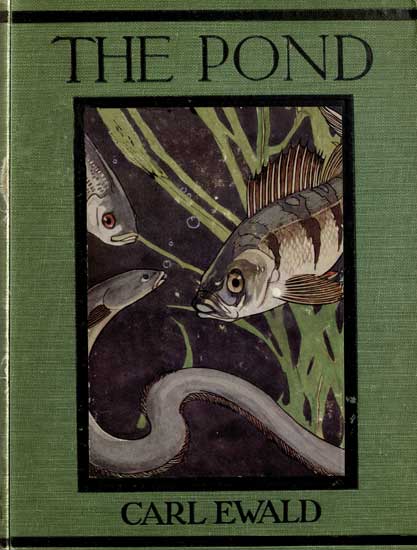
The Project Gutenberg EBook of The Pond, by Carl Ewald This eBook is for the use of anyone anywhere at no cost and with almost no restrictions whatsoever. You may copy it, give it away or re-use it under the terms of the Project Gutenberg License included with this eBook or online at www.gutenberg.org Title: The Pond Author: Carl Ewald Illustrator: Warwick Reynolds Translator: Alexander Texeira De Mattos Release Date: March 20, 2010 [EBook #31708] Language: English Character set encoding: ISO-8859-1 *** START OF THIS PROJECT GUTENBERG EBOOK THE POND *** Produced by D Alexander and the Online Distributed Proofreading Team at http://www.pgdp.net (This file was produced from images generously made available by The Internet Archive)

TRANSLATED FROM
THE DANISH BY
AND
ILLUSTRATED BY

THORNTON BUTTERWORTH Ltd
15 BEDFORD ST LONDON WC2
Published 1922

THE ROYAL ROAD
LIBRARY
1. TWO-LEGS
2. THE OLD WILLOW TREE
and other stories
6. THE POND
3. TOBY & THE ODD BEASTS
4. RACHEL & THE SEVEN WONDERS
8. MAGIC LONDON
5. THE BUTTERFLIES' DAY
7. THE PAGEANT OF THE FLOWERS
| Page | |
| CHAPTER I. | |
| THE BEGINNING | 13 |
| CHAPTER II. | |
| A MAN OF THE WORLD | 19 |
| CHAPTER III. | |
| A MOTHER | 27 |
| CHAPTER IV. | |
| THE WATER-SPIDER | 37 |
| CHAPTER V. | |
| THE BLADDER-WORT | 49 |
| CHAPTER VI. | |
| SUMMER | 59 |
| CHAPTER VII. | |
| THE CARP | 67 |
| CHAPTER VIII. | |
| THE MUSSEL | 77 |
| CHAPTER IX. | |
| THE WATER-LILY | 91 |
| CHAPTER X. | |
| THE CRAY-FISH'S JOURNEY | 99 |
| CHAPTER XI. | |
| THE WORST DAY OF ALL | 109 |
| CHAPTER XII. | |
| THE END | 123 |
| The cray-fish dropped off (Colour) | Frontispiece |
| The pike appeared among the reeds with wide-open mouth and rows of sharp teeth and angry eyes (Colour) | 40 |
| 'He was in my way,' said the spider | 44 |
| 'Oh! really,' said the perch (Colour) | 64 |
| He slammed his shell down | 80 |
| The Water Lily (Colour) | 96 |
| He lay in the water, hit by a stray shot | 116 |
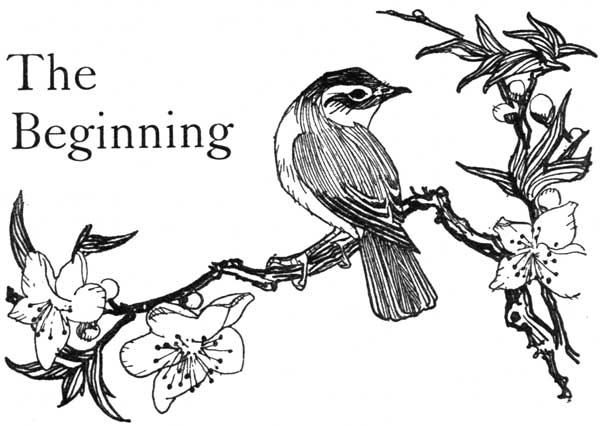
One day in early spring, a young reed-warbler sat in a bush in Italy and hung his beak.
This was not because he really had anything to complain of. The sun was shining; there were flies in plenty; and no one was doing him harm. A little while before, a pretty girl, with jet-black eyes, had sat under the bush and listened to his song and kissed her hand to him.[Pg 14]
And yet he wanted something.
He was tired of the Italian flies. He had a feeling in his wings as if he could do hundreds of miles at a stretch. There were notes in his throat which he was unable to get out and his little heart was filled with a longing which he could not understand and which would have made him cry, if a reed-warbler knew how to cry. But he can only sing and he sings just alike on all days, whether he be glad or sorry.
So he sang. And, when he stopped, he heard a voice, from a bush close by, which resembled his own to a nicety, only it was not so strong.
He was off in a moment and alighting on a twig gazed at the sweetest little lady reed-warbler that one could wish to set eyes on.
There was no one to introduce them to each other and so they introduced themselves. For there is not the same stiff etiquette among birds as at a court ball. Also things move more quickly; and, when they had chatted for five minutes or so, the reed-warbler said:
"Now that I have seen you, I know what's the matter with me. I am longing to go back to the land where I was born. I have a distinct recollection of a quiet pond, with reeds and rushes and green beeches round it."
"I am longing to go there, too," said the little reed-warbler. "I remember it also."[Pg 15]
"Then the best thing that we can do is to get engaged," said he. "As soon as we come to the pond, we will celebrate our marriage and build a nest."
"Will you love me till I die?" she asked.
"I can't answer for more than the summer," he replied. "But I promise you that."
Then she said yes. They had no one to announce the engagement to, for they had seen none of their relations since the autumn. So they had a little banquet to themselves. He treated her to some fat flies; and they sang a little duet and started on their journey.
They flew for many days.
Sometimes they rested a little, when they came to a green valley, and they also made travelling-acquaintances. For there were many birds going the same way and they often flew in flocks and flights. But the two reed-warblers always kept close together, as good sweethearts should. And, when they were tired, they cheered each other with tales of the quiet pond.
At last they arrived.
It was a beautiful morning towards the end of May. The sun was shining; and white clouds floated slowly through the sky. The beeches were quite out and the oaks nearly. The reeds and rushes were green, the little waves danced merrily in the sun and all things wore a look of sheer enjoyment.[Pg 16]
"Isn't it lovely?" asked the reed-warbler.
"Yes," she said. "We will live here."
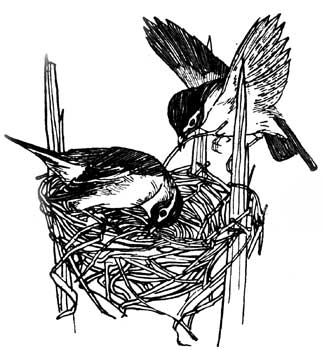
Close to the shore they found a place which they liked. They bound three reeds together with fine fibres, a yard above the water, and then wove the dearest little basket, which they lined with nice down. When the reeds swayed in the wind, the nest swayed too, but that did not matter, for it was bound fast and reed-warblers are never seasick.
It took them eight days to build it; and they were awfully happy together all the time. They sang, so that they could be heard right across the pond; and, in the evening, when they were tired, they hopped about in the reeds and smiled upon each other or peeped at their neighbours on either side and opposite.
"There's the water-lily shooting up through the water," said little Mrs. Reed-Warbler. "I remember her well; she is so stately and so beautiful."[Pg 17]
"There is the green frog sitting on the edge," said he. "He catches flies and grubs, just as I do, but there are enough here for both of us, so we shan't fall out."
"Look at the cray-fish crawling down below!" cried she. "And there's the roach ... and the perch ... and oh, look, there's quite a green wood at the bottom of the pond and fish swimming between the branches and caddis-grubs rocking in their cases!..."
"Yes, it's charming here," he said, in a tone as though it all belonged to him.
"And they all look so nice," she said, "and so happy. I feel sure they are all newly married like ourselves."
"Of course," said the reed-warbler. "Every one gets married in the spring. But I don't believe there's anybody in the wide world as happy as we are."
And then he stretched out his neck and sang, for all to hear:
There's not in the wide world a sweetheart like mine,
So fair, so fine,
And no singer on earth sings better!
Let others go worship whomever they will,
I'm true to my beautiful sweetheart still
And shall never, forget her.
"And so you're only going to love me for the summer?" she said.
"That's just a way of talking," said he.[Pg 18]
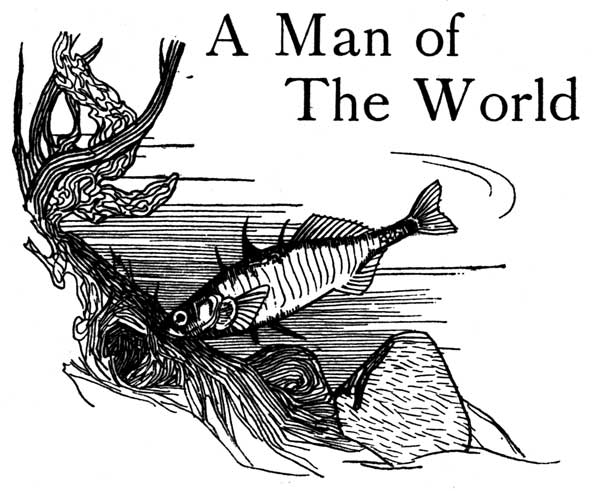
Little Mrs. Reed-Warbler heaved five deep sighs and, at each sigh, she laid an egg. Then she sat down on the eggs and sighed again.
And the reeds swayed in the balmy wind and the nest swayed and the eggs swayed that lay in the nest and the dear little brown bird that sat on the eggs. Even the husband swayed. For, when one rush sways, the[Pg 20] other sways too; and he was sitting on one just beside the nest.
"You're no worse off than others, darling," he said. "Look down into the water and see for yourself."
"I can see nothing," she said sadly.
"Fiddlesticks!" said the reed-warbler. "You can peep over for a minute, if you sit down again at once."
And so she peeped over.
It was certainly very busy down below.
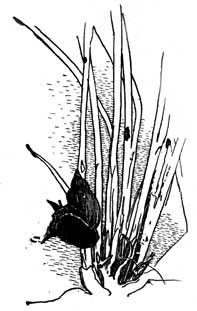
The pond-snail was swimming with her pointed shell on her back. She stood right on her head in the water and made a boat of her broad foot, which lay level with the surface of the pond and supported the whole fabric. Then she stretched out her foot and the boat was gone and she went down to the bottom and stuck a whole heap of slimy eggs to the stalk of a water-lily.
The pike came and laid an egg in a water-milfoil bush. The carp did the same; and[Pg 21] the perch hung a nice nest of eggs in between the reeds where the warblers had built their nest. The frog brought her eggs, the stickleback had almost finished his nest and hundreds of animals that were so small that one could hardly see them ran about and made ready for their young ones.
Just then, the eel put his head up out of the mud:
"If you will permit me, madam ... I have seen a bit of the world myself...."
Mrs. Reed-Warbler gave a faint scream.
"I can't stand that person," she said to her husband. "He's so like the adder, who ate my little sister last year, when she fell to the ground as she was learning to fly. He has the same offensive manners and is just as slippery."
"Oh," said the eel, "it's a great misfortune for me if I meet with your disapproval, madam, on that account. And it's quite unjust. I am only a fish and not the slightest relation to the adder, who took that little liberty with your sister, madam. We may have just a superficial resemblance, in figure and movement: one has to wriggle and twist. But I am really much more slippery. My name, for that matter, is Eel ... at your service."
"My wife is hatching her eggs," said the reed-warbler. "She can't stand much excitement."[Pg 22]
"Thank you for telling me, Mr. Reed-Warbler," said the eel. "I did not mean to intrude.... But as I have travelled considerably myself, like you and your good lady, I thought I might venture to address you, in the hope that we may hold the same liberal opinions concerning the petty affairs of the pond."
"So you are a traveller. Can you fly?" asked the reed-warbler.
"Not exactly," said the eel. "I can't fly. But I can wriggle and twist. I can get over a good stretch of country, which is more than most fish are able to say. I feel grand in the damp grass; and give me the most ordinary ditch and you'll never hear me complain. I come straight from the sea, you know. And, when I've eaten myself fat here, I shall go back to the sea again."
"That's saying a good deal," said the reed-warbler.
"Yes," said the eel, modestly. "And just because I have seen something of the world, all this fuss about children in the pond here strikes me as a bit absurd."
"You're talking rather thoughtlessly, my good Eel," said the reed-warbler. "I can see you have neither wife nor children."
"Oh," said the eel, making a fine flourish with his[Pg 23] tail, "that depends on how you look at it! Last year, I brought about a million eels into the world."
"Goodness gracious me!" said Mrs. Reed-Warbler.
"Aren't you exaggerating?" asked her husband, who was equally impressed, but did not wish to show it.
"Possibly," replied the eel. "That's easily done, with such large figures. But it's of no consequence. You can divide it by two, if that eases your conscience."
"And what about your own conscience, as the father of such an enormous progeny?"
"I never really consulted it," said the eel.
"And how's your wife?" asked little Mrs. Reed-Warbler.
"Can't say. I never saw her."
"You never saw your wife?"
"No, madam. Nor my children either."
"Indeed, you do your friends an injustice," said the reed-warbler. "For, only a moment ago, with my own eyes I saw how the stickleback built a nest down there for his children."
"The stickleback!" said the eel, with a sneer. "I can't stand sticklebacks: they prick me so horribly in the neck. But that has nothing to do with the case. What is a stickleback, I ask you? I remember once when I was caught and about to be skinned. I was[Pg 24] very small at the time and the cook, who was going to put a knife into me, said 'No bigger than a stickleback'!"
"Were you caught? Were you about to be skinned?" asked the reed-warbler. "How on earth did you escape?"
"I slipped away from the cook," replied the eel. "Thanks to my slipperiness, which your good lady disliked. Then I got into the sink ... out through the gutter, the gutter-pipe, the ditch and so on. One has to wriggle and twist."
"You may well say that!" said the reed-warbler.
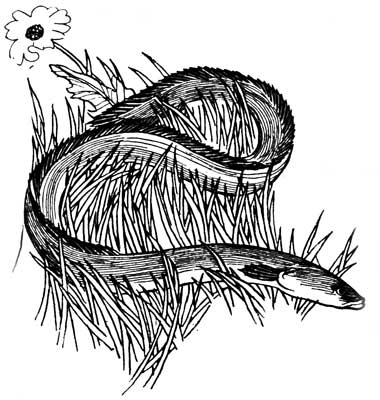
"One goes through a bit of everything, you see," said the eel. "But to return to what we were saying, take us eels, for instance. We fling our young into the sea and, for the rest, leave them to their own resources. Like men of the world that we are, we know what life is worth and therefore we fling them out wholesale, by the million, as I said just now: I beg pardon, by the half-million; I don't want to offend your love of accuracy. In this way, the children learn to shift for themselves at once. I was brought up in this way myself and learnt to wriggle and twist."
"I can't understand it," said Mrs. Reed-Warbler.
"Very sorry," said the eel. "Perhaps my conversation is rather too much for a lady who is sitting on her eggs."[Pg 25]
"I think children are the sweetest things in the world," she said. "One can't help being fond of them, whether they're one's own or another's."
"The ladies are always right," said the eel, eating a couple of caddis-grubs and a little worm. "But am I mistaken, or did I see you eat a grub just now, madam, which your husband brought you?"
"A grub...?"
"Yes ... isn't that a child too?"
"I shall faint in a minute," said Mrs. Reed-Warbler; and she did.
"Wriggle and twist!" said the eel; and off he went.
The reed-warbler brought his wife back to life with three fat flies, seven sweet songs and a jog on her neck.
"You ought to appreciate me, at any rate!" he said, when she was sufficiently recovered for him to speak to her. "The way I feed you and sing to you! Think what other husbands are like."
"So I do," she replied.[Pg 26]
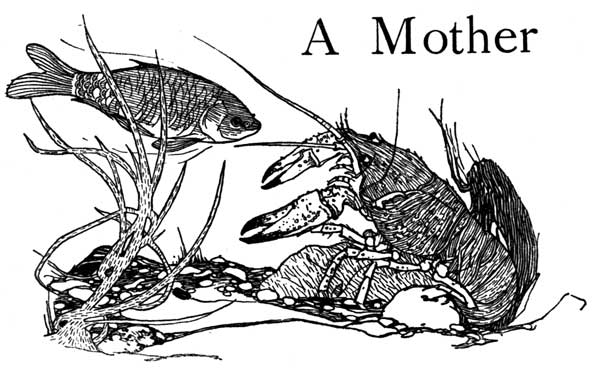
Time passed and all respectable bird-wives were sitting on their eggs and wearing a serious look in their eyes, while their husbands went hunting for flies or sang to them.
It was the same at the Reed-Warblers'. But there was no denying that the husband was sometimes a little tired and cross. Then he would reflect upon the easy time which the Eel husband had and the Frog husband and the Perch husband and all the others.[Pg 28]
One evening he sat in the nest and sang:
Now spring is here, to God all praise!
Though in hard work I'm up to the eyes.
For billing and cooing I'd just seven days;
Now I've to flutter about after flies
For my little wife, who our eggs is hatching;
And don't those flies just take some catching!
And each chick will want food for the good of its voice.
Aha, I have every right to rejoice!
"If you're tired of it, why did you do it?" said little Mrs. Reed-Warbler. "You took pains enough to curry favour with me at first. How smart you used to look. I believe you're already beginning to lose your colouring."
"It's weary work," he said. "When a fellow has to go after flies like this, in all weathers, his wedding-finery soon wears out."
"I don't think you're singing as nicely as you did," said she.
"Really? Well, I can just as easily stop. It's for your sake that I pipe my tune. Besides, you can see for yourself that I'm only joking. I'm tremendously glad of the children. It will be an honour and a pleasure to me to stuff them till they burst. Perhaps we might have been satisfied with three."
"You ought to be ashamed of yourself!" she said.
"So I am, dear, because of the other two. But, as I don't know which two those are, it makes no difference."[Pg 29]
She put on a very serious face. But he caught a fat fly that was passing, popped it into her mouth and struck up so pretty a trill that she fell quite in love with him again.
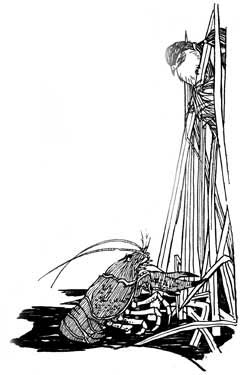
At that moment a deep sigh rose from the water under the bank.
"That came from a mother," said Mrs. Reed-Warbler. "I could hear that plainly."
"That's what it did," said a hoarse voice.
The Reed-Warblers peeped down and beheld a cray-fish, who sat in the mud staring with her stalked eyes.
"Dear me, is that you, Goody Cray-Fish?" said Mrs. Reed-Warbler.
"It is indeed, dear madam," said the cray-fish. "It's myself and no other. I was just sitting down here in my dirt listening to what the[Pg 30] quality were saying. Heavens, what a good time a fine lady like you enjoys, compared with another!"
"Every one has his burden," said Mrs. Reed-Warbler. "Believe me, it's no joke sitting here and perspiring."
The cray-fish crossed her eyes and folded her antennĉ.
"Yes, you may well talk," said she. "How long does it last with you? Four or five weeks, I should say. But I have to go for six months with mine."
"Goodness gracious! But then you can move about."
"Oh," said Goody, "moving is always a rather slow matter for a cray-fish. And then you have only five eggs, ma'am, but I have two hundred."
"Dear me!" said the reed-warbler. "Then your poor husband has to slave to provide food for that enormous family."
"He? The monster!" replied the cray-fish. "He knows too much for that. I haven't so much as seen him since the wedding."
"Then you must have a huge, big nest for all those eggs," said the wife.
"It's easy to see that you don't know poor folks' circumstance, dear madam," said the cray-fish. "People of our class can't afford nests. No, I just have to drag the eggs about with me as best I may."
"Where are they, then, Goody Cray-Fish?"[Pg 31]
"I carry them on my hind legs, lady. I have ten little hind legs, you see, besides my eight proper legs and my claws, which are very necessary to bite one's way through this wicked world with. And on each of my hind legs there is a heap of twenty eggs. That makes two hundred in all. I'll show them to you, if you like. The eggs are worth looking at."
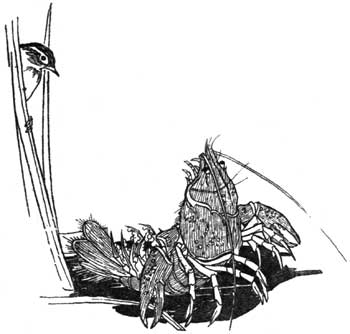
So saying, the cray-fish turned over on her back and stuck out her tail as far as she could. And there the eggs were, just as she had said, on ten little back legs.
"That comes of having too many hind-legs," said the reed-warbler.
"For shame! To poke fun at the poor woman!" said his wife.
But the cray-fish slowly turned round again and said, quietly:
"Gentlemen are always so witty. We women understand one another better. And I shouldn't so much mind about the eggs, if it wasn't that one can't change one's clothes."[Pg 32]
"Change your clothes?" asked Mrs. Reed-Warbler.
"Yes, ma'am ... you change yours too, from time to time, I know. I have seen the feathers with my own eyes, floating on the water. And it goes so easily and quickly: a feather here, a feather there and it's done. But other people, who wear a stiff shirt, have to take it all off at once. And I can't do that, you see, as long as I am carrying the eggs about. Therefore, since I have been married, I change only once a year. Now one always grows a bit stouter, even though one is but a common woman; and so I feel pretty uncomfortable sometimes, I assure you."
Mrs. Reed-Warbler was greatly touched; and her husband began to sing, for he was afraid lest all this sadness should make the eggs melancholy and spoil the children's voices.
But, at that moment, the cray-fish screamed and struck out with her claws and carried on like a mad woman.
"Look!... Ma'am ... do look!... There comes the monster!"
Mrs. Reed-Warbler leant so far over the edge of the nest that she would have plumped into the pond if her husband had not given her a good shove. But he had no time to scold her, for he was curious himself. They both stared down into the water.[Pg 33]
And there, as she had said, came Goody Cray-Fish's husband slowly creeping up to her backwards.
"Good-day, mother," he said. "I'm going to change."
"Oh, are you?" she screamed. "Yes, that's just like you. You can run and change at any moment while your poor lawfully-wedded wife has to go about in her old clothes. You would do better to think of me and the children."
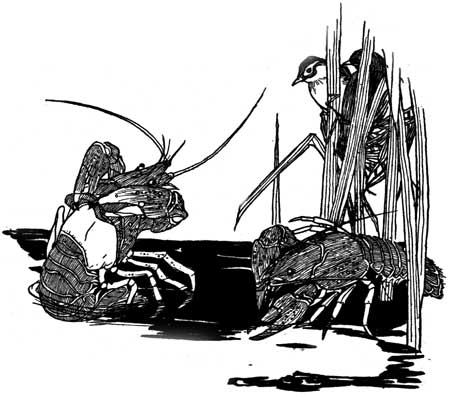
"Why should I, mother?" he replied, calmly. "What good would it do if I thought of you? And[Pg 34] what need have I to meddle with women's work? What must be must be. Hold your tongue now, while it lasts, for this is no joke!"
Then the reed-warblers saw how he raised himself on his tail and split across the middle of his back. Then he bent and twisted and pulled off his coat over his head.
"That's that," he said, puffing and blowing. "Now for the trousers!"
Mrs. Reed-Warbler drew back her head, but immediately peeped down again. And the cray-fish stretched and wriggled until, with a one, two, three, the shell of his tail was shed as well.
Now he was quite naked and funny to look at and talked with a very faint voice:
"Good-bye, mother," he said. "Give the young ones my love, for they will be gone, I daresay, before I come back again. I am retiring for ten days or so and shall be at home to nobody."
"You monster!" yelled Goody. "Just look at him ... now he'll creep into his hole and lie there idle. In ten days' time he'll come out again, in brand-new clothes, looking most awfully arrogant." She wrung her claws and glared terribly with her stalked eyes. "I should really like to crawl into the hole after him and bite him to death," she continued. "His[Pg 35] life isn't worth twopence in his present condition. But I loved him once. And one is and remains just a silly woman."
"Yes, Goody Cray-Fish, and then you have the children," said little Mrs. Reed-Warbler.
"That's true," she replied. "And, indeed, they are my only comfort. The dear little things, I feel as if I would love to eat them. You should just see, ma'am, how they hang on to my skirts during the first week. They are so fond of me that they simply can't leave me."
"How nice that is!" said Mrs. Reed-Warbler.
"Yes. And afterwards I have no trouble with them at all. You may believe me or not, as you please, dear lady, but, as soon as they are a week old, they go into the world and look after themselves. It's in their blood. It has never been known in the pond for a twelve-day-old cray-fish to be a burden on his family. And then you're done with them; and that may be rather sad, but, of course, it's a relief as well: two hundred children like that, in a small household! But you shall see them, ma'am, when they come ... I really have to control myself in order not to eat them, they're such dears!"
"Well, I'll tell you something, Goody Cray-Fish," said Mrs. Reed-Warbler. "When my young ones are out, you shall have the shells."[Pg 36]
"Oh, how good of you, ma'am!" said the cray-fish. "You could not possibly do me a greater kindness. For I promise you I shall eat them. I eat as much chalk as I can get hold of against the time when I change my things, for that puts starch into the new shirt. But then, also, you must really promise me, ma'am, to look at my young ones. They are so sweet that, goodness knows, I should like to eat them...."
At that moment, a large carp appeared in the water, with a sad, weary face:
"You do eat them," he said.
"Oh!" yelled Goody, and went backwards into her hole and showed herself no more.
But Mrs. Reed-Warbler fainted on her five eggs and the carp swam on with his sad, weary face.[Pg 37]
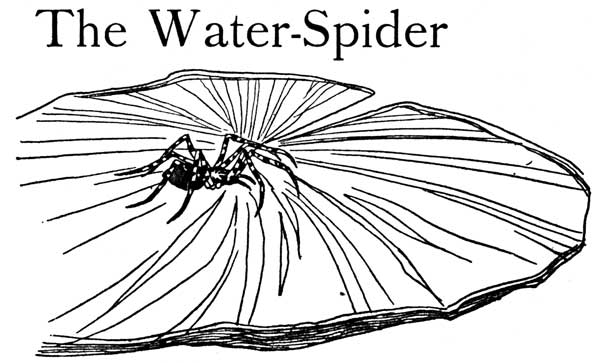
Little Mrs. Reed-Warbler was not feeling very well.
She was nervous and tired from sitting on the eggs and she had just a touch of fever. She could not sleep at night, or else she dreamt of the cray-fish and the carp and the eel and screamed so loud that her husband nearly fell into the pond with fright.
"I wish we had gone somewhere else," she said. "Obviously, there's none but common people in this pond. Just think how upset I was about Goody Cray-Fish. Do you really believe she eats her children?"[Pg 38]
Before he could reply, the eel stuck his head out of the mud and made his bow:
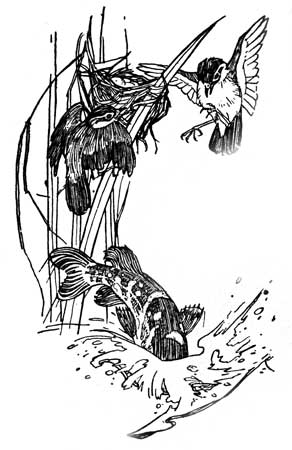
"Absolutely, madam," he said, "ab-so-lutely. That is to say, if she can get hold of them. They decamp as soon as they can, for they have an inkling, you know, of what's awaiting them. Children are cleverer than people think."
"But that's terrible," said Mrs. Reed-Warbler.
"Oh, well," said the eel, "one eats so many things from year's end to year's end! I don't condemn her for that. But, I admit, it doesn't look well amid all that show of affection.... Hullo, there's the pike!... Forgive me for retiring in the middle of this interesting conversation."
He was off.
And the pike appeared among the reeds with wide-open mouth and rows of sharp teeth and angry eyes.
"Oof!" said Mrs. Reed-Warbler.
"Come down here and I'll eat you," said the pike, grinning with all his teeth.
"Please keep to your own element," said Mrs. Reed-Warbler, indignantly.
"I eat everything," said the pike, "ev-e-ry-thing. I smell eel, I smell cray-fish, I smell carp. Where are they? Tell me at once, or I'll break your reed with one blow of my tail!"
The reed-warblers were silent for sheer terror. And the pike struck out with his tail and swam away. The blow was so powerful that the reeds sighed and swayed and the birds flew up with startled screams. But the reeds held and the nest remained where it was. Mrs. Reed-Warbler settled down again and her husband began to sing, so that no one should see how frightened he had been. Then she said:
"A nice place this!"
"You take things too much to heart," said he. "Life is the same everywhere; and we must be satisfied as long as we can get on well together. I am very much afraid that all this excitement will hurt the children's voices[Pg 40] and then they will disgrace us at the autumn concert. Pull yourself together and control yourself!"
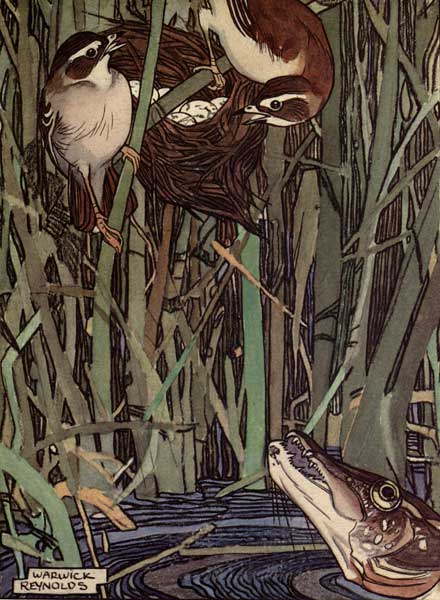 THE PIKE APPEARED AMONG THE REEDS [p. 38
THE PIKE APPEARED AMONG THE REEDS [p. 38
"It's easy for you to talk," she said. "And I know well enough what life is worth. My innocent little sister was eaten by an adder and my mother was caught by a hawk, just after she had taught us to fly. I myself had to travel in hot haste to Italy, last autumn, if I didn't want to die of hunger. Then you came; and I have already learnt that marriage is not an unmixed blessing. After all, one would be glad of peace just after the children are born. And then, of course, I think of what the children will grow up like in this murderers' den. Children take after others. And such examples as they see before them here! Really, it might end in their eating their parents!"
"Yes, why not, if they taste good?" asked a ladylike voice on the surface of the water.
Mrs. Reed-Warbler shrank back and hardly dared look down.
A little water-spider sat on the leaf of a water-lily and smoothed her fine velvet dress.
"You're looking very hard at me, Mrs. Reed-Warbler, but you won't eat me," she said. "I lie too heavy on the stomach. I am a bit poisonous ... just poisonous enough, of course, and no more. Apart from that, I am really the most inoffensive woman in the water."[Pg 41]
"And you say that one ought to eat one's parents?" asked Mrs. Reed-Warbler.
"Maybe that was a rather free way of talking to a bird," said the spider. "What suits one doesn't necessarily suit another. I only know that I ate my mother last year and a fine, fat, old lady she was."
"Sing to me, or I'll die!" screamed Mrs. Reed-Warbler.
Her husband sang. And, meanwhile, they looked down at the water-spider.
She plunged head foremost into the water. For a moment, she let her abdomen float on the surface of the pond and distended her spinnerets till they were full of air. Then the creature sank and shone like silver as she glided down to the bottom.
"That's very, very pretty," said the reed-warbler.
"Be quiet," said his wife and stared till she nearly strained her neck.
Deep down in a bush, the spider had spun a bell, which she filled with air. The bell was built of the finest yarn that she was able to supply and fastened on every side with strong, fine threads, so that it could not float away. And round about it was a big web for catching insects.... Just now a water-mite was hanging in it and the spider took her into the bell and sucked her out.[Pg 42]
"It's really remarkable," said little Mrs. Reed-Warbler. "She has a nest just as we have, hung up between the reeds. For all we know, she may sit on her eggs."
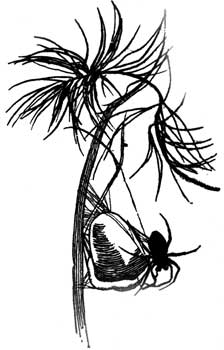
"Ask her," said the reed-warbler.
"I want first to get to the bottom of that story about her mother," said she, sternly.
Soon after, the spider came up again and sat on the leaf of the water-lily and smoothed herself out.
"You were looking down at me, weren't you?" she said. "Yes ... I have quite a nice place, haven't I? A regular smart little parlour. You must know I am an animal that loves fresh air, like Mr. Reed-Warbler and yourself. And, as my business happens to lie in the water, it was easiest for me to arrange it this way. It's thoroughly cosy down there, I assure you. And, in the winter, I lock the door and sleep and snore the whole day long."[Pg 43]
"Have you any eggs?" asked Mrs. Reed-Warbler.
"Rather!" said the spider. "I have everything that belongs to a well-regulated household. I have any number of eggs. As I lay them, by degrees, I hang them up in bundles from the ceiling of my parlour."
"Don't you hatch them?"
"No, dear lady. My heart is not so warm as that. And it's not necessary either. They come out nicely by themselves."
"Did your husband help you build the parlour?" asked Mrs. Reed-Warbler.
"He had enough to do building for himself, the booby!" she said. "You needn't think I would have him in my parlour, He made himself a little room beside it; and then there was the tunnel between us and that was really more than enough."
"Was?" asked Mrs. Reed-Warbler. "Is he no longer with you, then?... Oh, you mustn't take my question amiss, if it pains you. I find it so difficult to understand the domestic conditions of the lower classes.... Perhaps you don't even know where he is?"
"Why, I should just think I did know!" replied the spider. "More or less. For I ate him last Wednesday."[Pg 44]
"Goodness gracious me!" said Mrs. Reed-Warbler.
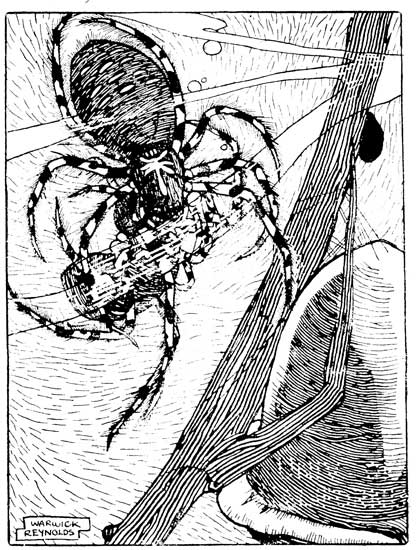 'HE WAS IN MY WAY,' SAID THE SPIDER
'HE WAS IN MY WAY,' SAID THE SPIDER
"He was in my way," said the spider. "I tumbled over him wherever I went. And what was I to do with him? So I ate him up; and a tough little brute he was!"
"She ate her husband on Wednesday and she ate her mother last year," said Mrs. Reed-Warbler. "Sing to me, or that terrible woman will be the death of me!"
But the reed-warbler himself was so frightened that he could not get out a note. And the spider did not care in the least.
"Yes ... mother," she said. "That was only out of hunger. I didn't eat her alone, either. My brothers and sisters shared in the feast. We were famishing and there was nothing else to eat, for it was well in the autumn. Then mother came along, just in the nick of time, and so we ate her."
She jumped into the water again.
But Mrs. Reed-Warbler did not sleep a wink that night. She kept on whispering to herself:
"She ate her mother ... she ate her husband on Wednesday...."
"Come, don't think about it," said the reed-warbler. "Why, your own
mother was eaten by the hawk; and, if you eat me, it will be for love!"[Pg 45]
"You ought to be ashamed to jest in such times as these," said she.
"I think all times are alike," he said. "Those we live in always seem the worst."
Then morning came and the sun shone and he sang to his little brown wife until she recovered her spirits.[Pg 48]
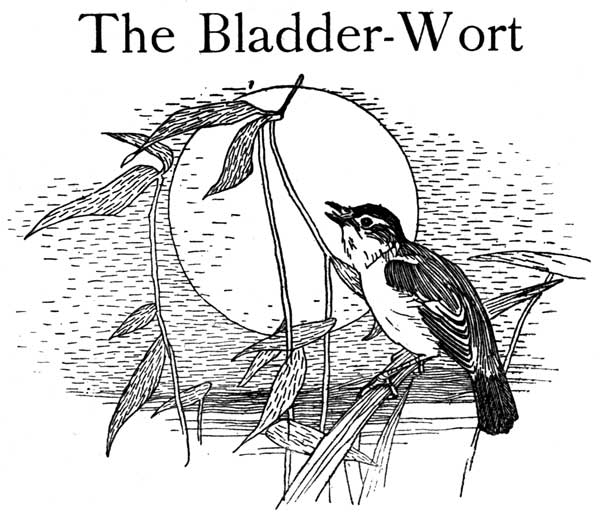
Little Mrs. Reed-Warbler's babies were now expected any day.
There was no end to her nervousness and unreasonableness. Her husband simply could not satisfy her. If he brought her a fly, she shook her head and asked how could he think her capable of eating immediately[Pg 50] before the most important event in her life. If he brought her none, she said it was evidently his intention to starve her. If he sang, it was unbearable to listen to him. If he was silent, she could plainly see that he no longer cared for her.
"You don't appreciate me as I deserve," he said. "You ought to be married to the eel for a bit, or to the cray-fish's husband; then you would know what's what."
"And you ought to have taken the spider," said she. "Then you would have been eaten."
"Dear lady! Dear lady!" cried the cray-fish from down in the mud.
"Well?" said the reed-warbler.
"I can't stand this!" said Mrs. Reed-Warbler.
"I only wanted to ask you, dear lady, not to forget me and those shells," said the cray-fish.
"I won't have anything to do with an odious woman like you, who eats her own children," replied Mrs. Reed-Warbler.
"Oh, dear!... Surely, ma'am, you don't believe that mean carp who was here the other day? A horrid, malicious fellow like that! He doesn't even belong to the pond, you know. He's a regular man's fish. They only put him here to fatten him up and eat him afterwards ... I saw it myself last year; he was[Pg 51] a mere spawn then; now he has grown big and stout on men's food; and he has plenty of time, too, since he doesn't have to work like another; and so he runs round and slanders poor people and robs them of the sympathy of kind ladies like yourself."
"Stop your chattering, Goody Cray-Fish," said the reed-warbler. "You'll drive my wife quite silly with your silly talk."
"Oh, dear!... Well, I beg a thousand pardons," said the cray-fish. "I only want to remind the lady about the egg-shells."
Then she went backwards into her hole.
"Why will you think so much about all that rabble?" said the reed-warbler to his wife. "There are other things in the world besides cray-fish and eels and spiders. Find something pretty to look at. That would do you good just now."
"Show me something," she said, languidly.
"Look at the beautiful white flower down below there," said he. "See how charmingly he rises above the water. He surely can be neither a robber nor a cut-throat."
It was really a beautiful white flower that grew up from the bottom of the pond on a long, thin stalk and looked exceedingly sweet and innocent. Mrs. Reed-Warbler glanced at him kindly:[Pg 52]
"What's your name, you pretty flower?" she asked. "May I look at you a little?"
"Look as much as you please," replied the flower. "My name's Bladder-Wort, and I have no time to waste in talking to you. I have things to attend to and must hurry."
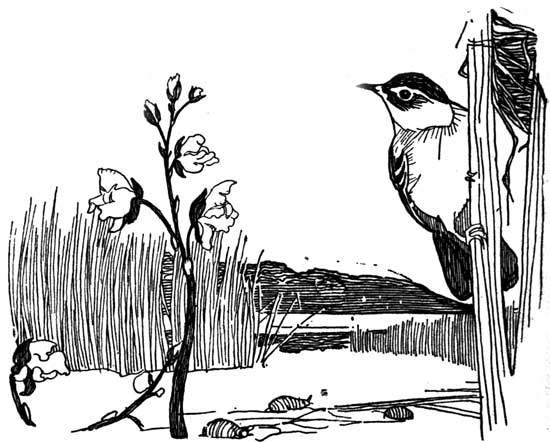
Mrs. Reed-Warbler stretched her neck and peeped down into the water.
"That horrid spider has her nest between his leaves," she said.
"Well, the bladder-wort can't help that," replied her husband. "It's a flower's fate to stand where he stands and take things as they come. He sucks his[Pg 53] food calmly out of the ground, has no stains on his flowers, and no blood on his leaves. That's what makes him so poetic and so refined."
"Hush!" she said. "They are talking together."
And talk together they did, with a vengeance.
"Have you caught anything?" asked the bladder-wort.
"Indeed I have," replied the water-spider. "I don't go to bed fasting. This is a good time of year for water-mites, and so I don't complain. And how have you done?"
"Nicely, thank you," said the bladder-wort. "I have caught a hundred and fifty midge-grubs and forty carp-spawn this afternoon. But I'm not satisfied. I don't believe I could ever be satisfied."
"What's that he's saying!" whispered little Mrs. Reed-Warbler, and looked at her husband in dismay.
"Be quiet," he said. "Let us hear more."
The spider went into her parlour, hung seven eggs from the ceiling, swallowed a mouthful of air and came out again.
"You're really a terrible robber," she said. "If it wasn't that I had come to lodge with you, I should be furious with you. Why, you take the bread out of my mouth!"
"Nonsense!" said the bladder-wort. "Surely there's[Pg 54] plenty for the two of us! I am quite pleased to have a lodger who drives the same trade as myself. It gives one something to talk about."
"It's really odd that a flower like yourself should have turned robber," said the spider. "It's not in your nature, generally speaking."
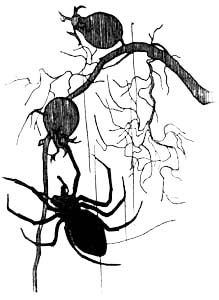 Bladder Traps I.
Bladder Traps I.
"What am I to say?" replied the flower. "These are hard times. There are a great many of us, and the earth is quite exhausted. So I hit upon this and it goes swimmingly. But then I have got my apparatus just right. Would you like to see it?"
"Very much," said the spider. "But you won't hurt me, will you?"
"Be easy," said the bladder-wort, with a laugh. "You're too big for me. Run along one of my stalks and I'll explain the whole thing to you."
The spider crept cautiously for some way down the branch and then stopped and looked at a little bladder there.
"That's tight," said the bladder-wort. "That is one of my traps. I[Pg 55] catch my prey in them. I have a couple of hundred of them."
"So you can eat two hundred water-mites at a time?" said the spider, enviously.
"I can. If they come. But I'm never so jolly lucky as all that. Now just look: beside the bladder you will see a little flap, which is quite loose. When some fool or other knocks up against it, it goes in and—slap, dash!—the fool tumbles into the bladder. He can't get out; and then I eat him at my leisure."
"Do you hear?" whispered Mrs. Reed-Warbler.
"Yes," said the reed-warbler, with a very serious face.
The spider could not resist fumbling at the flap with one of her legs:
"Ow!" she yelled suddenly.
She darted back with a jerk and the leg remained caught in the bladder. It was drawn inside in a twinkling and the flap closed and the leg was gone.
"Give me back my leg, please," said the spider, angrily.
"Have I your leg?" asked the bladder-wort. "Well then, you must have touched the flap. What did you do that for, dear friend? I made a point of warning you!"
"You said I was too big."[Pg 56]
"So you are, worse luck! But, of course, I can easily eat you in bits, like this."
"It's not nice of you, seeing that you're my landlord," said the spider. "But as I have seven legs left, I suppose I must forgive you."
"Do, dear friend," said the bladder-wort. "I must tell you, I am not really master of myself when those flaps are meddled with. Then I have to eat what is inside of them. So be careful next time!"
"You may be sure of that," said the spider. "One has to be cautious with a fellow like you. Would you think it indiscreet if I asked you what my leg tastes like?"
"Oh, well," said the bladder-wort, "there wasn't much on it. For that matter, I've finished, in case you care to see what's left of it."
Just then the flap was opened, and a tiny little hard stump was flung out into the water.
"Is that my leg?" asked the spider.
"Don't you recognise it?"
The bladder-wort laughed contentedly. The spider stood and looked at the stump for a little while. Then she said good-night and limped sadly into her parlour.
"Good-night," said the bladder-wort, pleasantly. "And good luck to your hunting in the morning."[Pg 57]
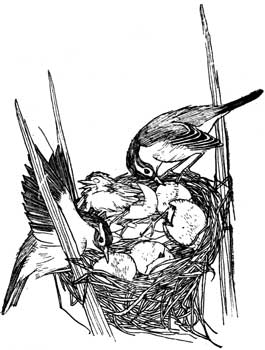
"I shall never survive this," said little Mrs. Reed-Warbler.
But, at that moment, she felt something alive under her:
"The children!" she screamed.
She was up on the edge of the nest in a second. On the opposite side sat her husband, watching just as eagerly as she.
One egg was quite in two and one of the others was burst. A wee, blind, naked youngster lay in the nest; and from the other egg protruded the dearest little leg of a chick.
"Did you ever see anything like it?" cried she. "Isn't it charming?"
"Delightful!" said he.
Then they began carefully to peck at the other eggs. And, inside, the young chicks pecked with[Pg 58] their little beaks and five minutes later, they were all five out.
"Help me to clear up," she said.
Out flew the shells, on every side, down into the water.
"God bless you, kind lady!" cried Goody Cray-Fish from down below.
She was out for an evening stroll. But no one heard her. The reed-warblers were mad with delight over their children and had no thought for anything else in the world.
"What are you thinking of?" said the husband. "They'll perish with cold. Sit on them at once!"
And she sat on them and covered them up and peeped at them every moment.
But he stayed up half the night, singing, on the top of the reed.[Pg 59]
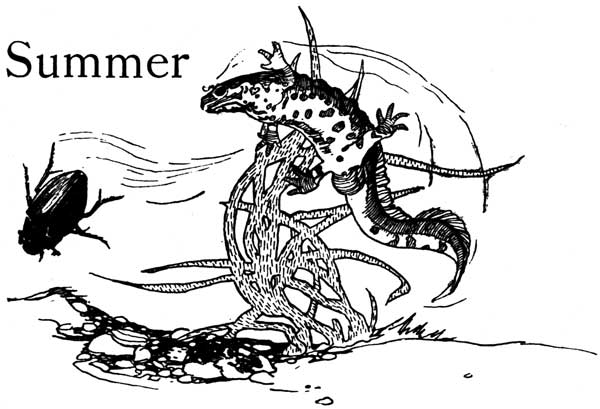
The whole pond was alive.
There were not only great, horrid pikes and great mannerly carp and roach and perch and sticklebacks and eels. There were cray-fish and frogs and newts, pond-snails and fresh-water mussels, water-beetles and daddy-long-legs, whirligigs and ever so many others.
There was the duck, who quacked at her ducklings, and the swan, who glided over the water with bent neck[Pg 60] and rustling wings, stately and elegant. There was the dragon-fly, who buzzed through the air, and there were the dragon-fly's young, who crawled upon the water-plants and ate till they burst. But that did not matter; they just had to burst, if they were to come to anything.
There was the bladder-wort, who had his innocent white flowers above the water and his death-traps down at the bottom; the spider, who was still his lodger and now had the whole ceiling full of eggs, and hundreds of thousands of midge-grubs, who lay on the surface of the water and stuck up their air-vessels and hurried down to the bottom the moment a shadow fell over the pond. There were hundreds of thousands of midges, who danced in the air, and there was the water-lily, who knew how beautiful she was, and who was unapproachable for self-conceit.
There were many more, whom you could not count without getting dizzy. And then there were the tadpoles, who were ever so many and ever so merry. And you only had to take a drop of water and examine it through a magnifying-glass to see how it swarmed with tiny little animals, who all danced about and ate one another without the least compunction.
But just under the reed-warblers' nest there was a little May-fly grub, who was in a terrible state of fright.[Pg 61]
She had entered into conversation with little Mrs. Reed-Warbler one day, when the latter had gone all the way down the reed to find food for her five youngsters, who were simply insatiable and kept on crying for more. Just at that moment, the May-fly grub had come up to the surface; and now the bird's beak was exactly over her.
"Let me live," said she.
"That's what they all say," said Mrs. Reed-Warbler. "My children have to live, too!"
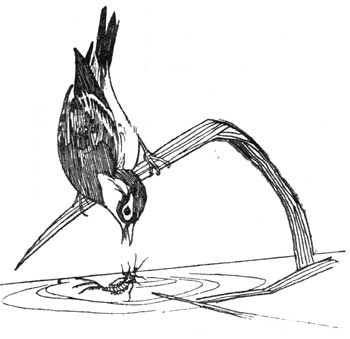
So saying she tried to snatch her. But the grub wriggled so and looked so queer that she could not.
"Listen to me for a moment," said the grub; "then I'm sure that you won't hurt me. I am so small and so thin and fill so little space in a stomach."
"Well, what is it?" asked Mrs. Reed-Warbler.
"I have lived here a long time," said the grub. "I have heard you talk to your husband and to the cray-fish[Pg 62] and the eel and the spider. It was all so beautiful, what you said. I am certain that you have a good heart."
"I don't know about my heart," said Mrs. Reed-Warbler. "But I know I have five hungry children."
"I am a child myself," said the grub. "And I should so awfully like to live till I grow up."
"Do you think that life is so pleasant?"
"I don't know. I am only a child, you see. I crawl about down here and wait. When I am grown up, I shall have wings and be able to fly like you."
"You don't surely imagine that you're a bird?" asked Mrs. Reed-Warbler.
"Oh, no! I certainly don't aim so high as that. I shall just become a May-fly."
"I know them," said Mrs. Reed-Warbler. "I have eaten lots of them. They taste very good."
"Oh, well, in that case, do wait for me to grow up, before you eat me. I shall only live for a few hours, you know, when I get my wings. I shall just have time to fly once round the pond and lay my eggs in the water. Then I must die. And then you may eat me and welcome. But let me go now. And tell your husband also. He has been after me twice."
"Very well," said Mrs. Reed-Warbler, "though it's foolish of me. You'll probably cheat me and let someone else eat you first."[Pg 63]
"I shall do my best to escape," said the grub. "And, now, thank you ever so much."
Before the grub had done speaking, little Mrs. Reed-Warbler was up in the nest again, with six midge-grubs, which she had caught in one bite. Her husband was there too with a dragon-fly, which the children tore to pieces and ate up amid cries of delight.
"There's nothing the matter with their appetites or with their voices either," he said. "If only they could shift for themselves! I am as lean as a skeleton."
"And what about me?" said she. "But the children are thriving and that is the great thing."
He sighed and flew away and came home and flew away again; and so it went on till evening. Then they both sat wearily on the edge of the nest and looked out across the smooth pond:
"It is curious how the life exhausts one," she said. "Sometimes, when I feel thoroughly tired, I can almost understand those animals who let their children look after themselves. Did you notice the eel the other day? How fat and gay he is."
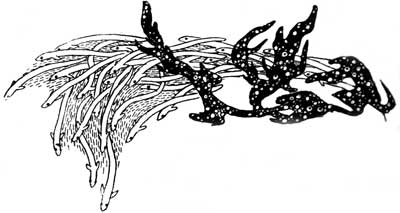
"Are you talking of me, madam?" asked the eel, sticking his head out of the mud.
"Oh, you're always there!" said Mrs. Reed-Warbler.
"More or less. One has to wriggle and twist."
"Have you any news of your children?"[Pg 64]
"No, thank goodness!"
"Oh, really?" said the perch. "I have an idea that I ate a couple of them at breakfast.... Excuse me for being so frank!"
"Not at all, not at all!" said the eel. "The family is large enough even so."
"How on earth did they come up here from the sea?" asked the roach.
"Just as I did, I imagine," said the eel. "They've got scent of something to be made here; and two or three miles are nothing to them."
"Heigho!" said Mrs. Reed-Warbler.
"Are you sighing because of all this fuss with the children? Well, madam, what did I tell you?"
"Not at all," replied Mrs. Reed-Warbler. "I could never behave like you."
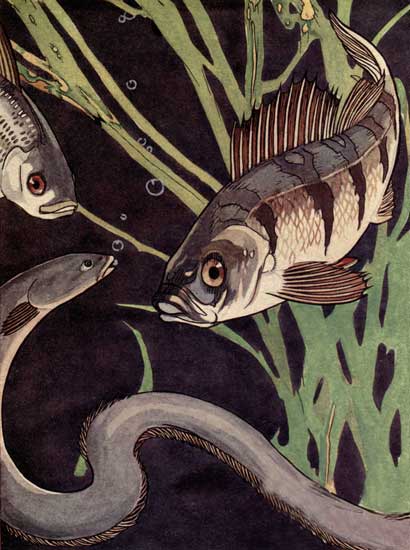 'OH! REALLY,' SAID THE PERCH [p. 64
'OH! REALLY,' SAID THE PERCH [p. 64
"One has one's duties," said the reed-warbler.[Pg 65] "And the loftier one's station in life, the heavier the duties."
"Thank goodness, then, that I am of lowly station," said the eel. "I have a capital time in the mud."
"Then, again, one is interested in preserving a certain amount of poetry in the world. There is plenty of rabble, plenty of ugliness, I admit. All the more reason why we higher animals should do something to promote the ideal. And I can't imagine anything more ideal than a father's labours on behalf of his family, even though they do become rather fatiguing at times."
"You're tremendously up in the clouds to-day, Mr. Reed-Warbler," said the eel. "Every one to his taste. But, as for poetry, I must confess that I have not seen much of it in my life. And yet I have wriggled and twisted about the world a good deal. The great question, everywhere, is eating and eating and eating. And those who have children to care for are the worst robbers of the lot. Good-bye."
"That's a disgusting fellow," said Mrs. Reed-Warbler. "It was very nice of you to give him a piece of your mind. I quite agree with you. Besides, I myself performed a really fine action to-day."
She ran to the reed and looked into the water:
"Are you there, my little grub?" she asked.
"Yes, thank you," said the May-fly grub.[Pg 66]
"And how are you?"
"Fairly. The eel almost caught sight of me; and I was nearly getting into the bladder-wort's prison; and the water-spider was after me before that. Otherwise, I'm all right."
"What's this now?" asked the reed-warbler.
"Oh," answered his wife, "it's a protegée of mine! A little May-fly grub. I promised that I wouldn't eat her. She is so happy at the thought of being grown-up ... and that only for a couple of hours, poor little thing!"
She said nothing about her intention of eating the grub when she was grown up; and the reed-warbler was seriously angry.
"What sentimental gammon!" he said. "It's unseemly for a woman with five children to commit such follies."
"I thought it so poetic to give her leave to live," said she.
"Fiddlesticks!" said her husband. "Poetry doesn't apply to one's food. If it did, we should all die of hunger. Besides you can't take a creature like that into consideration."
Thereupon he ran down the reed and hunted eagerly for the grub, to eat her.
But she heard what he said and had gone down to the bottom with terror in her little heart.[Pg 67]
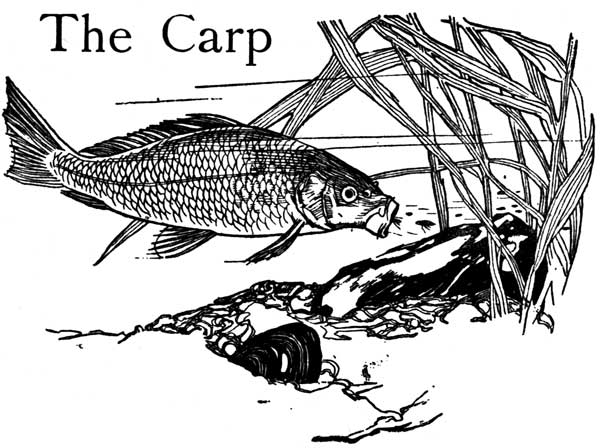
The summer wore on and things grew worse and worse.
No end of young had come out of the eggs and they filled the whole pond. Out in the middle it was quite green with millions of little water-weeds, which died and rotted and reeked till seven big perch died of it and floated on their backs.[Pg 68]
"The pond's blossoming!" sneered the rushes.
"There's a horrid smell here," said Mrs. Reed-Warbler.
"I think, considering all things, that it's delightful here," said the carp.
The carp swam a little way in among the reeds. He had made a friend there, in the shape of the fresh-water mussel, who waded ever so slowly through the mud, or else settled on the bottom and yawned.
They suited each other, these two, for they were quiet and sedate people, who led the same sort of life.
"I don't care to go hunting wildly for food," said the carp. "I open my mouth where the water is moderately thick and let whatever there is run in. Something always sticks. Then one needn't kill people and one doesn't see all that misery."
"It's just so with us," said the fresh-water mussel. "I employ exactly the same methods. It's more gentlemanly and I have grown stout on it."
Then the two sat and talked and yawned all the time and amused themselves capitally notwithstanding.
"Mind you don't go too near them," said Mrs. Reed-Warbler to the May-fly grub.
"Yes, I will; thanks very much," said the grub.
"The carp and the mussel are nicer than the others, I think," said Mrs. Reed-Warbler to her husband.[Pg 69]
"Really? And why, pray, madam?" asked the eel, who was always where he was least expected. "Surely they do just the same as all of us ... only the animals which they eat are smaller."
"There is a difference, my good fellow," said the reed-warbler. "It's only your lack of refinement that prevents your seeing it."
"Yes, wriggle and twist!" said the eel.
The reed-warbler did not condescend to answer him, but turned to the carp and the mussel, struck up a little trill and said politely:
"My wife and I have the honour to bid you good-morning, gentlemen. We are delighted to observe that you lead your lives in a more mannerly way than most of the other inhabitants of the pond. We have suffered greatly at the sight of the extraordinary cruelty ..." he paused, caught a blue-bottle, and tossed it to his children in the nest ... "of the extraordinary cruelty that prevails in society here. It cannot but be extremely unpleasant for well-bred people to witness the cynical and unveiled brutality with which every one satisfies his app— ..." Here he seized a caddis-fly, ate it, wiped his mouth, and continued, "satisfies his appetite. You, gentlemen, are different. If you had wings, I should be inclined to believe that originally you did not belong to this company at all."[Pg 70]
"Your presumption is absolutely correct," replied the carp, waving his fins complacently.
"You are quite right," said the mussel, yawning politely.
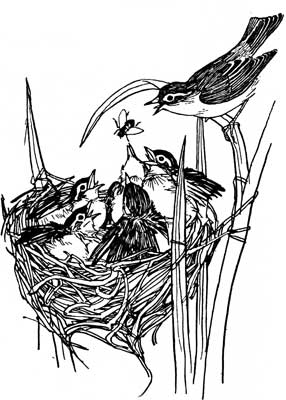
"I was born in another pond," said the carp, "but I must confess that I have no distinct recollection of it. I only know that they did not lead such a wild, brigand's life there as here. For instance, I don't think there were any fish but carp in the pond, which, of course, improved the tone, you know. No doubt it was a nobleman's carp-pond. We were fed five times a day and everything was removed that could inconvenience us in any way. Until I came[Pg 71] here, I had never set eyes on such things as pikes, water-spiders or that horrible bladder-wort."
"It must have been idyllic there," said the reed-warbler. "May I ask, were there no reed-warblers?"
"Oh, yes!" said the carp, "I think they had permission to build in the reeds. And then there were a good many frogs, probably to cheer us up with their croaking."
"Then how did you come here?"
"A-ah," said the carp, "that's not an easy question for me to answer. You see, we came in a basket, I and a large number of my friends. And then we were tilted out into the pond. I can't think of any other reason than that they wished to improve the tone here. We had nothing to complain of where we were before. Did you hear anything about well-bred people in this place expressing such a wish?"
"No," said the reed-warbler. "It didn't happen in my time. But I have only been here since the spring."
"Oh, I see," said the carp. "Yes, I've been here four years. I wish I were anywhere else. One lives in everlasting terror of the pike. A number of my friends have disappeared in an utterly incomprehensible manner and, I believe, saving your presence, that the pike has eaten them. And then, as you very properly observed, the prevailing tone here is rather ill-bred.[Pg 72] But it doesn't matter much to you. I presume you go away in the autumn?"
"A little trip to Italy," said the reed-warbler, "with my family."
The carp waited and thought for a while. He yawned once or twice, then said:
"You might be able to do me a service ... it occurred to me when I saw that nice, pointed beak of yours."
"Delighted, I'm sure," said the reed-warbler.
"You see, every one has his cross to bear and mine is in my gills. Would you care to see?..."
He opened one of his gill-lids and the reed-warbler ran down the reed and peeped in:
"Yes, upon my word," he said, "there's a cross there."
"That's the double-animal," said the carp with a deep sigh.
"The what?..."
"The double-animal. Unfortunately, I have to admit that I brought him with me from the otherwise first-rate, high-class carp-pond which I was telling you about. The pain he caused me even then was great, but lately it has become almost unendurable. You must know, the animal consists originally of two worms ... of the kind, you know, that don't care to[Pg 73] work for themselves, but take up their quarters with respectable people and suck at them. I have a couple of dozen of those in my stomach, but they don't inconvenience me anything like so much as the double-animal. You see, to increase the meanness of the proceeding, these scoundrels have a trick of fastening together in pairs, cross-wise. They suck themselves firmly on to each other, until they grow into one, and then they suck at me with united strength."
"I never heard anything like it!" said the reed-warbler.
"I have one like it on the other side of my head, in my other gill," said the carp. "We can talk about him later. Meanwhile, may I ask you if you would kindly try to remove the brute with your beak? I should be exceedingly grateful to you. I am in such pain that I would rather die than go on living like this."
At that moment, it was as though the world were coming to an end.
The reed-bank heaved and swayed, the reeds snapped. The reed-warblers screamed, all the seven of them; the water spurted up; the mussel rolled over; the spider's parlour was smashed.
"At last!... At last!..."
It was the pike's voice.
"Spare my life! Spare my life!" yelled the carp.[Pg 74]
What happened next no one was ever able properly to describe.
The carp cracked and crunched between the pike's teeth, and all who were near thought their last day had come. But, a little after, it grew still and, when the reed-warblers had recovered themselves, the pike was gone, and the carp's tail-fin lay and floated on the water.
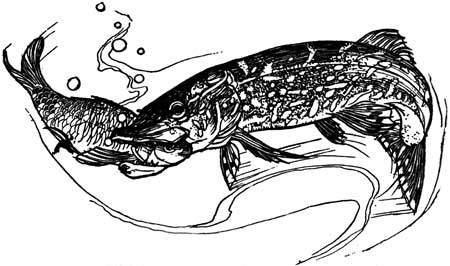
The reed-warblers' nest had dropped down on one side and they had to work for some time before they got it right. However, all the children were safe and sound and gradually they recovered from their alarm. The water grew clear again and the mussel sat down below and yawned.[Pg 75]
"That was a noble character, that friend of yours who has been taken from us," said the reed-warbler.
"Yes," said the mussel. "For that matter, I have had experiences of my own...."
"We shall look forward to hearing your story to-morrow," said the reed-warbler. "We are too much upset to talk any more to-day."
Just then, the carp's tail sank to the bottom.
Goody Cray-Fish caught it and dragged it to her hole.
"Poor people must be content with crumbs from the rich man's table," said she.[Pg 76]
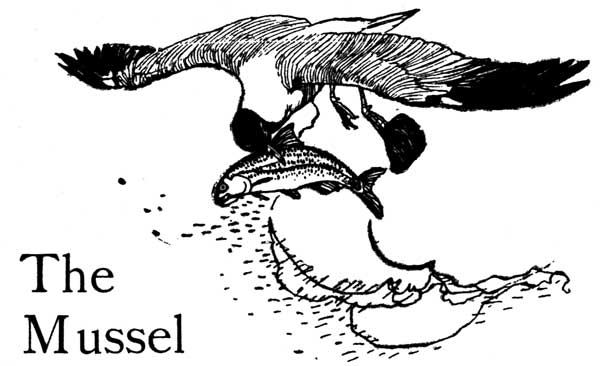
The next evening, the reed-warbler peeped down into the water.
The fresh-water mussel was sitting there and yawning as usual. There was nothing out of the way about him.
"Good-evening," said the reed-warbler. "How are you, after your friend's unhappy end?"
"Thank you," replied the mussel. "It has not disturbed my composure in the least. Generally speaking, nothing disturbs my composure. Only, if any one[Pg 78] sticks something between my shells, I become furious and I pinch."
"I should do the same in your place," said the reed-warbler. "And your equanimity is really quite enviable. But still I think that the misfortune of one's neighbour ... of your intimate friend."
"I have no neighbour," said the mussel. "And the carp was not my intimate friend. We were not rivals, that is all. In a case like that, it's easy to be friends. I was often amused at the carp's way of talking. But I never contradict, except when any one sticks something between my shells. The carp had had to do with human beings; that's what it was. It always makes animals so ridiculous. You're the same, for that matter."
"I look upon that as a compliment," said the reed-warbler, who was a little offended but did not wish to show it. "However, I have nothing to do with human beings, except that they protect me and have not the heart to do me harm, because of my pretty voice. They stop and listen to me as they pass. Many a poet has written beautiful lines about me."
"Oh, really?" said the mussel. "Upon my word, they did something of the sort about me too. But what they said was lies."
"What did they say?"
"There was a lot of rubbish about pearls."[Pg 79]
"Oh, have you pearls? Wife! Wife! The mussel has pearls!"
"Not a bit of it," said the fresh-water mussel. "Do stop shouting like that. You can be heard all over the pond. If any one overheard you, I should be in danger of being fished up. Thank goodness, there are no pearls formed on me!"
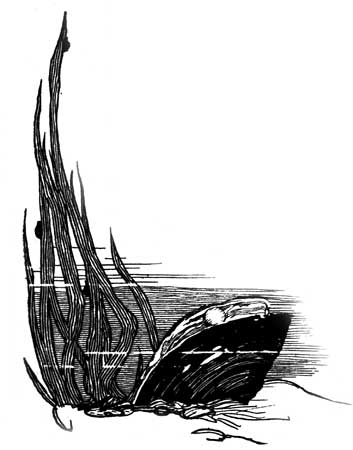
"O-oh!" said the reed-warbler, in a disappointed tone.
"It's just the pearls the poets talk their nonsense about. They sing of how happy the mussel is with the precious pearl he guards, and all that sort of thing.... Do you know what a pearl is?"
"No," said the reed-warbler.
"It's a nasty, pushing parasite ... something like the double-animal that hurt the carp. When it comes into us, it hurts us, of course. Then we cover the brute with mother of pearl till it dies. And then it sits on our shell and plays at being a pearl."[Pg 80]
"Oh!" said the reed-warbler. "Do you hear that, wife? All our illusions are vanishing one by one. Soon there will be nothing but vacancy around us."
"Oh, it won't be vacant so long as we have those five greedy children!" said she. "They are crying for more."
"They shall have no more to-day," he answered, crossly. "You and I have been running and flying about for them all day long. Now, upon my word, I intend to be left in peace to have a chat with the neighbours. Let's give them a flogging."
And a flogging they got. And then they cried still more and then they went to sleep.
"You hinted last night that you were not born here, in the pond," said the reed-warbler. "Tell us where you come from."
"With pleasure," replied the mussel. "I am fond of a gossip in the evening myself. And no one will believe that I have had any experience, because I move about so little.... But wait a bit. There's a saucy person there I want a word with...."
It was no other than Goody Cray-Fish.
She had crawled nearer and was fumbling at the mussel with her legs. Now he slammed his shell down upon one of them and cut it off in the middle. Goody screamed like one possessed and hammered away at the mussel with her claws, but he only laughed.[Pg 81]
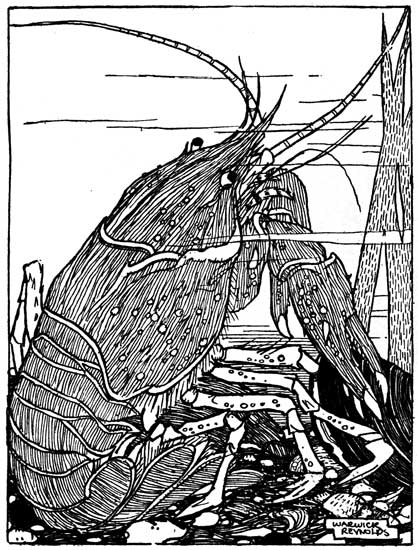 'HE SLAMMED HIS SHELL DOWN'
'HE SLAMMED HIS SHELL DOWN'
"What a common fellow!" cried Goody. "Can't he leave a respectable woman alone?"
"Aye," said the mussel, "when she doesn't go for me!"
"A wretched mussel like that!" she screamed. "A mollusc! He is much lower in rank than I and he dares to be impertinent. I have twenty-one pairs of legs and he knows it: how many has he?"
"Come along, with all the one-and-twenty!" said the mussel.
Goody went on scolding and then the reed-warbler interfered:
"Drop that strong language now," he said. "It doesn't matter about those legs. I have only two myself."
"I should be sorry to be found lacking in respect for you, Mr. Reed-Warbler," said the cray-fish. "I know who are my betters, right enough. But I can't understand how a fine gentleman like you can care to talk to one of those molluscs."
Scolding and grumbling, she withdrew to her hole, but left her head and claws hanging outside. The mussel opened his shell, but kept four or five of his eyes constantly fixed on Goody. These eyes were on the edge of the mantle which lay in the slit between the shells. As soon as the cray-fish made the slightest movement, he closed his shells at once:[Pg 84]
"One's soft inside all right," he said. "But one shows the hard shell to the world."
"Go on with your story," said the reed-warbler.
"I was born in another pond, far from here," said the mussel. "I can't give you a detailed description of it, because, as you will understand, one in my position does not have many opportunities of looking about him. It was not as grand as in the high-class carp-pond, that's sure enough. To be honest with you, I think it was much the same as here—an awful heap of rabble of every kind, but lots of mussels in particular. They sat in the mud as close as paving-stones and took the bread out of one another's mouths. If you had a mouthful of water, it was generally mere swipes. Some one else had sucked all the goodness out of it, you see."
"What did you do then?" asked the reed-warbler.
"I did nothing," replied the mussel. "I never do anything, except when any one sticks something between my shells. Then I become furious and I pinch.... Hullo, are you there again, Goody Cray-Fish? Do you want one of your little legs amputated, eh?"
"The wind-bag!" said the cray-fish.
"But you might have died of hunger," said the reed-warbler.
"One doesn't die so easily as that," replied the[Pg 85] mussel. "Unless an accident befalls one, as in the case of our poor carp. In fact, I once lay for a whole year on a table in a room."
"Goodness gracious!" said the reed-warbler. "How did you get there?"
"I was fished up by a student or somebody. He wrapped me in a piece of paper and put me on the table. He wanted to see how long I could live. Every Saturday, he unpacked me and poured a little water over me; and that was enough to keep me alive."
"But how did you escape from him?"
"Well," said the mussel, "it was when he got engaged. People used to come and see him sometimes, you know, and, of course, they all had to look at the wonderful mussel that refused to die. There was a young girl among them who was very cross with him for teasing me so. But he only laughed at her. Well, when I had been there a year, he got engaged to her.... They were sitting on the sofa just by me, when it happened, and I was not so dead but that I could lift my shells a little and see the whole thing: they're funny creatures, those human beings! Well, then he asked her if there was anything she would like on that joyful day. Yes, she would like me to be put back in the water again. He laughed at her. But off they went with me to the very pond where I was fished up and[Pg 86] threw me in. Then I settled down among the other fellows and began all over again."
"Yes ... love!" said the reed-warbler, looking round at his wife.
"Ah ... love!" said she, returning his glance.
"I have nothing to say against it," said the mussel. "But, as a matter of fact, I have no personal experience of it."
"Surely you have a wife," said the reed-warbler. "Or, perhaps ... perhaps you are a lady ...?"
"I am neither one or the other. I am just a mussel. And I lay my eggs and then that's done!"
"Do you look after your children nicely?" asked the reed-warbler.
"What next!" exclaimed the mussel. "My children are very remarkable individuals. They are sailors."
"Sailors?"
"Yes, they are indeed. As soon as they come out of the egg, they hoist a great sail and put out. It's only when they grow older, if they haven't been eaten by that time, that they settle down as decent mussels with shells upon them and philosophy in their constitutions."
"Don't let us talk about children," said the reed-warbler. "It always upsets my wife so. Tell us now how you found your way to this pond."[Pg 87]
"Ah," said the mussel, "that comes of a peculiarity I possess of becoming furious when any one sticks something between my shells. I don't know if I told you that I possess that peculiarity?"
"You've told me several times," answered the reed-warbler. "I shall never forget it; I shall take care, be sure of that."
"Mind you do," said the mussel. "You know, it was one of your sort that managed my removal."
"A reed-warbler?"
"I don't exactly know if it was a reed-warbler. I can't see very well outside the water.... Good-day to you, good-day to you, Goody Cray-Fish! I can always see you!... And to me one bird is much like another. However, it must have been a gull. Well, I was sitting at the bottom and yawning, as I usually do. Just above me was a little roach. Then, suddenly, splash came the gull and seized the roach. He swooped down at such a pace that he plumped right to the bottom. One of his little toes stuck between my shells and I pinched. The gull tugged and pulled, but I am strong when I become furious and I held tight. He was the stronger, in a way, nevertheless. For he pulled me off the bottom and then I went up through the water and into the air."
"Why, it's quite a fairy-tale!" said the reed-warbler.[Pg 88]
"We flew a good distance," the mussel continued, "high above the fields and woods. I could just peep out, for my shells were ajar because of the bird's toe. We lost the fish on the way, but I held on, however much the gull might struggle and kick. Of course, I did not mean to hang on for ever, you know, but I wanted to have my say as to where we should alight. Suppose I had been dropped into a tall tree and had to hang there and wait until a student came and got engaged...."
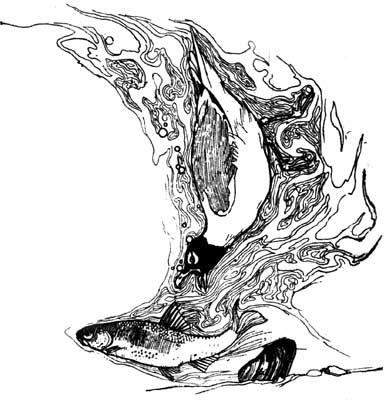
"He would have come all right," said the reed-warbler. "I've travelled a great deal, but I have never been anywhere that there wasn't a student who got engaged."
"Well, in my case, it would have been rather uncertain," said the mussel. "And so, when I looked down and saw that there was blue underneath me, I let go and fell here, into the pond."[Pg 89]
"And are you satisfied?"
"Yes, for the present. I have seen no other mussels, so it is a good deal pleasanter than in the other place."
"That's a curious story," said the reed-warbler.
Then he sat and fell a-thinking and night came.
But Mrs. Reed-Warbler ran down the reed and peered into the dark water:
"Are you there, my little grub?" she asked.
"Yes, thank you," said the May-fly grub.
"Have you had a good time to-day?"
"Yes, thank you. I was only nearly eaten up by the perch; and then there was a duckling after me and a horrid dragon-fly grub and a water-beetle. Otherwise everything was very nice indeed."[Pg 90]
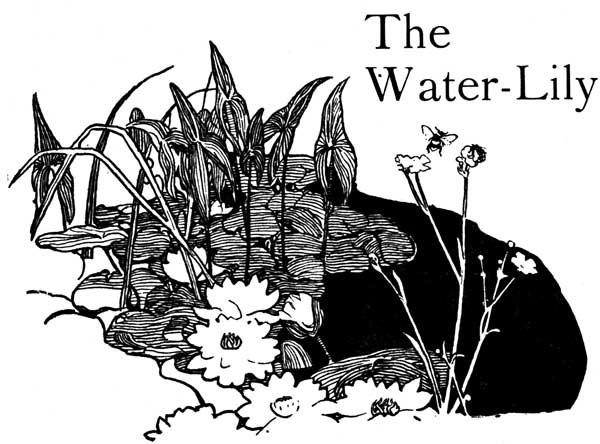
"Don't you think we shall be able to let the children out soon?" asked the reed-warbler.
"Certainly not!" said his wife. "There can be no question of the little dears standing on their legs for quite a month yet."
"They can stand on their legs as it is," said he,[Pg 92] "for they nearly trample one another to death when I come along with a silly fly. I tell you, it's getting a bit difficult to provide food for everybody. There are such an awful lot of us after it now. There are children all over the neighbourhood and they are all crying out for food."
"Are you beginning to see the truth of what I said, madam?" asked the eel, sticking his head out of the mud.
"Hold your tongue and mind your own business, you ugly fish," said Mrs. Reed-Warbler.
"Your husband has come round to my views long ago," said the eel. "I can see that plainly. He would give anything to be able to roam about as a free bird, instead of wearing himself out with a big family."
"You're quite mistaken, my good fellow," said the reed-warbler. "I certainly admit ..."
"You'd better mind what you're admitting!" screamed his wife and pecked at him.
"Wriggle and twist!" said the eel; and off he went.
That afternoon, Mr. and Mrs. Reed-Warbler sat discussing the question again:
"If only we can hold out," said he. "Just now, I was fighting like mad with my old friend, the flycatcher, for a ridiculous little grub. I got it, but he will never forgive me. When poverty comes in at the door,[Pg 93] love flies out at the window, as the human beings say. It will end in screaming and quarrelling all over the pond."
"It cannot be worse than it is," said she. "Do as I do and think of all the beautiful things the poets have sung about us. It always helps to keep one's spirits up."
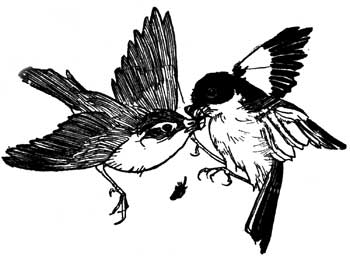
"I wish I had a couple of nice little poets here to feed the children with," said he, grumpily.
They sat again for a while, plunged in gloomy thoughts. The young ones were having their mid-day nap. Then he said:
"Things are queerly divided in this world. The number of sorrows and cares that we have, we free birds, to whom the whole world is open! Look at the water-lily. She's bound to her place. She has to struggle up through the dark water for ever so many days before she reaches the surface. Then she's there and unfolds her white flower and is happy. She hasn't a care ...[Pg 94] look at her, lying and rocking and dreaming. I wish we were water-lilies!"
"Yes," said Mrs. Reed-Warbler. "And her seeds ripen in her lap and then glide down in the water and take root and grow up and, next year, they blossom around her. Oh, how delightful it must be!"
"Yes, but think of the bladder-wort and how he took us in!" said he.
"Pooh!" she replied. "Of course, it was that horrid spider who lived with him that led him into evil courses. No one will make me believe that there is anything but peace and contentment in the water-lily's beautiful calyx."
"Hush!" he said. "She's talking to that pretty little spear-wort beside her."
The two anxious birds bent their heads and listened.
"You spiteful minx!" said the water-lily. "You enticed two bumble-bees away from me to-day, though you haven't a farthing's-worth of honey in your withered calices."
"Scold away!" said the spear-wort. "All your fine clothes won't help you in the least. Things go by merit, you see. No respectable bumble-bee will look at a frivolous person like you. And you may be sure that I have more honey in one of my flowers than you in your whole body."[Pg 95]
"Here I stand with all my pollen ripe," said the water-lily, "and can't get rid of it. How can any one care to look at a beggar like you? But I shall find a way of revenging myself. You annoyed me long ago, when we were growing up through the water. Your nasty thin stalks swarmed over me and would have choked me, if they could. You, with your pretence! In the autumn, there won't be a particle of you left. It's too funny, that you should be allowed to stand in the way of respectable people."
"In the autumn, my seeds will be ripe and sown, Water-Lily dear," replied the spear-wort. "And, next spring, I shall grow up and tease you, just as I'm doing now. Trust me for that."
"Unless they come and clean out the pond first," said the water-lily. "For then they'll take you and leave me here because of my beauty."
The spear-wort could say nothing to this, for it was true.
"Did you hear?" whispered Mrs. Reed-Warbler.
"Hush," answered the reed-warbler. "Here comes a bumble-bee."
And a big, buzzing bumble-bee came and whirred upon her wings and hung for a while in the air, above the two flowers.[Pg 96]
"This way, please, dear Bumble-Bee!" cried the water-lily and displayed her white petals to the best advantage. "I keep the freshest honey in the whole district. Pray come nearer. I have combs and combs full. And here is pollen in fancy wrappers. And I have laid out my broad green leaves on the water for you to rest on, if you are tired. See for yourself ... it is quite dry here ... pray ..."
"Don't mind that humbug," said the spear-wort. "This is the real old shop for honey. I scorn to advertise in that silly way, with big white petals and all that pretence. I put all I know into my honey and my pollen. I only have a little white flower for you to know me by."
"You must on no account be seen going into that common shop," screamed the water-lily. "Your honoured children will simply be poisoned by the stuff she keeps. If indeed she has any, for there were two big bumble-bees with her this morning and they looked very dissatisfied when they flew away."
"Don't you believe her," cried the spear-wort. "It's sheer jealousy makes her talk like that. The bumble-bees were exceedingly pleased and they have produced a quantity of honey. Mother Water-Lily's is yesterday's. No one will have anything to say to it; I swear it's all spoilt."
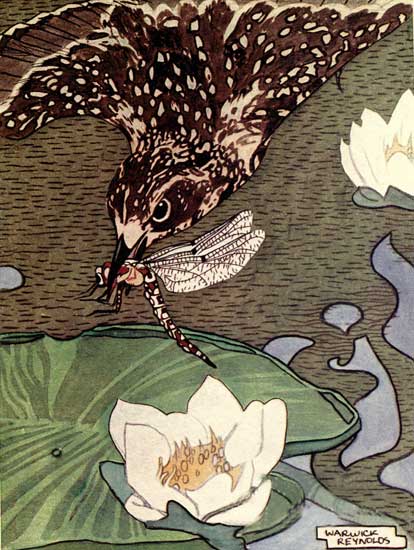 THE WATER LILY
THE WATER LILY
"Buzz ... buzz ...!" said the bee and flew away.
"You humbug!" said the water-lily.
"You idiot!" said the spear-wort.
"That's the worst of keeping bad company," said the water-lily.
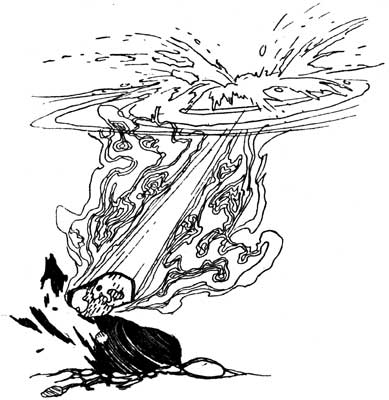
"It comes of your mountebank ways, of course," said the spear-wort. "They're enough to drive respectable people from the pond."
They could think of nothing more to say and lay on the water and looked angrily at each other.
"Oh dear!" said little Mrs. Reed-Warbler. "Where on earth is one to go to find poetry?"
"Where can one find a fly?" said her husband.
"We must take life as it is," said the mussel, "and meddle with it as little as possible. That's what I do; and there's nothing to prevent my remaining here and growing to be a hundred."
A boy stood on the edge of the pond. He had a big stone in his hand. Suddenly, he flung it into the water with all his might. Then he went on and thought no more about it.
But the stone had hit the mussel and smashed him to pieces.
"There!" he said. "That's the end of me. Both shells smashed ... there's nothing to be[Pg 98] done. Good-bye and thank you for your pleasant company."
One by one all the eyes on his mantle grew dim; and then he was dead.
"Goodness knows who will be the next!" said the reed-warbler.
But Goody Cray-Fish came slowly crawling and took the dead mussel in her claws:
"Now I shall get my leg back with interest," said she.[Pg 99]
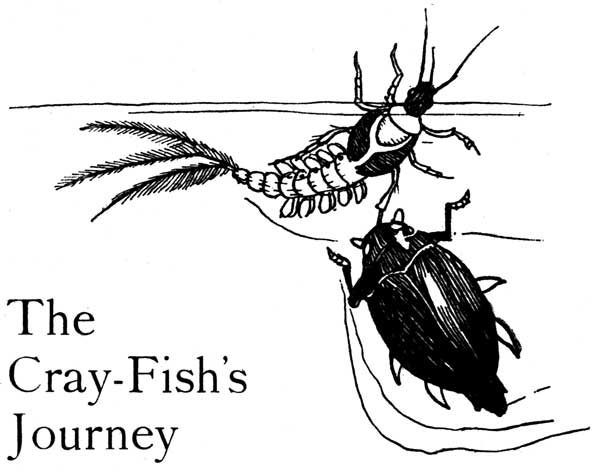
"How is my dear grub?" asked little Mrs. Reed-Warbler.
"Pretty well, thanks," replied the May-fly grub. "There was a roach, who wanted to eat me; and two caddis-grubs, who tugged at me; and a whirligig, who[Pg 100] bit me in one of my legs. Otherwise, I've had a capital time."
Aren't you almost ready?"
"To-day or to-morrow, I think."
"Take care you don't meet with an accident first," said Mrs. Reed-Warbler, kindly.
Goody Cray-Fish crept round restlessly:
"Food's scarce," she said. "Oh, if I were only a smart bird and could fly away! But, it's true, you're angry with me, ma'am, and I hardly dare speak to you."
"I was very angry with you," said Mrs. Reed-Warbler. "But, since then, I have experienced such horrors that I've almost forgotten it. I have made the acquaintance of a spider who ate her own mother."
"Oh dear, oh dear!" said the cray-fish. "That's enough to upset any mother."
"So it is. She also ate her husband."
"I don't say that's right," said the cray-fish. "But at any rate it's more excusable, for men are neither more nor less than monsters. Oh, of course, I make an exception of your own husband, ma'am."
"Is it true, Goody Cray-Fish?" said Mrs. Reed-Warbler—"tell me, did you really eat your children?"[Pg 101]
"I had the misfortune to eat seven of them," replied the cray-fish, with a woebegone face. "But it was out of sheer love. They were so nice. And, as I was patting them with my claws, I happened to touch them too hard. So I had to eat them myself, rather than let them go to strangers."
"It's terrible to listen to," said Mrs. Reed-Warbler.
"Yes, it's sad," said the cray-fish. "But their troubles are over now, poor little dears, while their hundred and ninety-three brothers and sisters have to go on struggling through this wicked world! Goodness alone knows how many of them are still alive and how they are doing!"
"Yes, it's a wicked world," said Mrs. Reed-Warbler.
"Would you mind telling me, ma'am?" asked the cray-fish, "don't you think a body might get away from the pond?"
"We shall leave in the autumn," said Mrs. Reed-Warbler, "for Italy. But you have no wings, Goody Cray-Fish, so I don't see how you can go."
"That's just it. If one had wings, one would soon be off. But they might be in one's way in the water. However, there are other people who travel, though they have no wings. What about the eel, ma'am, for instance?"[Pg 102]
"Yes ... the eel," said Mrs. Reed-Warbler. "He can wriggle and twist. You can't, you see."
"No," replied the cray-fish looking very sadly out of her stalked eyes. "I can't do that at all. Because of my stiff shirt, you know. Though I may be thankful for it, too, or I should have been done for long ago."
"What do you propose, then?"
The cray-fish crawled right under the reeds, where the nest hung, and asked, in a low whisper:
"What do you think of the mussel, ma'am?"
"The mussel?"
"Yes, the mussel. You see, I sit here in the mud and hear such a lot of things and turn them over in my mind. And I heard the story with which the mussel was diverting you and Mr. Reed-Warbler the other day. Do you think it's to be depended on?"
"Of course I do."
"Well, I don't take much account of the mussel," said the cray-fish. "A mollusc like that! And then he insulted me, besides. But I've eaten him now and I don't like to speak harm of what I've eaten myself. And, if the story is genuine, another person might possibly save herself in the same manner."
"Why, you have no shells to pinch with, Goody Cray-Fish!"[Pg 103]
"No, but I have my claws," replied the cray-fish. "And, believe me, ma'am, they can pinch too."
The reed-warbler came home from hunting and his wife told him about the cray-fish's plan. They both laughed at it, but Goody Cray-Fish stuck to her guns.
She did not go to her hole all the morning, but crawled around and swam on the surface of the water, to see if no opportunity offered.
About the middle of the day, a little roach came skimming along.
"Look out, grub!" cried Mrs. Reed-Warbler.
"I've hidden under a leaf and I'm all right," replied the May-fly grub.
"Here's the roach," said the cray-fish. "Now we only want the gull."
She kept just under the roach and looked out eagerly, in every direction, with her long eyes.
"What do you want, you ugly cray-fish?" said the roach, and struck out with his tail.
"I sha'n't hurt you, Mr. Fish," said she. "The pond is meant for everybody, I should think. Surely a person's entitled to go and take the air outside her own door."
The eel put his head out of the mud:
"That's right, Goody Cray-Fish, stick to it!" he said. "Wriggle and twist!"[Pg 104]
And the reed-warblers laughed and peeped down to see what on earth was going to come of it; and the youngsters were told as much of it as their little brains could take in, and they peeped too. The spider ran up and looked on, the May-fly grub was nearly jumping out of her cocoon with curiosity. The bladder-wort forgot to catch insects, the water-lily and the spear-wort stopped quarrelling; they all stared at the cray-fish and the roach. For they had all heard something of what was at hand, one from the other. But none of them said a word, lest they should frighten away the roach; he was the only one who had not the least suspicion. Only the reeds whispered softly to one another. But this they always do, so nobody minds them.
Just then a gull swooped down upon the roach.
It made such a splash in the water that no one could quite see what happened. But the roach was gone, and presently the reed-warblers exclaimed:
"Look!... Look!... There's the gull flying with the roach ... and the cray-fish is hanging on to his hind-toe!"
The water-lily and the spear-wort shouted the news and the rushes whispered it on and soon there was not a midge-grub in the pond but knew all about the extraordinary thing that had happened.[Pg 105]
"So she had her way," said the reed-warblers.
And they discussed for quite an hour where she would be likely to arrive, but no one could work that out and none of those in the pond ever got to know.
Only the woman who lived by the pond knew. For, when the gull came above the chimney of her little cottage, he gave such a kick with his leg that the cray-fish dropped off. She went right down the woman's chimney; and there stood a pot of boiling water, which she fell into.
"Oh dear!" said the cray-fish. "That was a silly business."
It was so silly that she turned as red as fire all over her body and died then and there. But, when the woman took her pot and was going to make herself a drop of coffee, she stared in amazement at that fine big cray-fish:
"Well, I never!" she said. "Best thanks to whoever sent you."
Then she ate her.
That same evening, the May-fly broke through her cocoon.
She flew up, on tiny little thin, transparent wings and with three long threads hanging from her abdomen to help her keep her balance.[Pg 106]
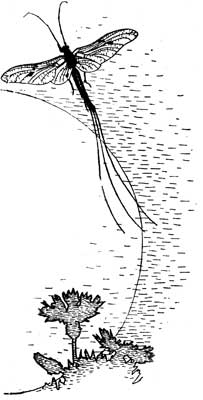
"I say, isn't this lovely?" she cried. "How delicious life is! It's worth while living for ever so many days as a poor grub, if only one is permitted to gaze upon this splendour for an hour."
"Oh, so you're there, are you?" said Mrs. Reed-Warbler. "You look very nice."
"Thank you," said the May-fly. "Now I must just go round the pond and lay my eggs. Then I'll come back and sit down in the reeds and die; and then you can eat me. And a thousand thanks to you for sparing my life that time and for warning me when I was in danger. If you hadn't done that, I should never have beheld this glorious sight."[Pg 107]
"If only you don't over-eat yourself on the way and forget your promise!" said Mrs. Reed-Warbler.
"There's no danger of that," replied the May-fly. "I have eaten all I need. I haven't even a mouth! I shall just enjoy an hour or two of this delightful life and then lay my eggs. That's my lot; and I don't complain."
"Life is not so delightful as you think," said Mrs. Reed-Warbler. "If I were a true friend to you, I would save you from seeing all your illusions shattered."
"How can you say that life is not delightful?" said the May-fly. "Look ... and look ... and look...."
"I will be a true friend to you," said Mrs. Reed-Warbler. "You shall be spared disappointment. I will eat you straight away."
Then she caught her and ate her.
"Good-evening, madam," said the eel. "Are you sitting and contemplating the poetry of Nature? I just saw you destroying a bit of it ... for the May-fly.... That's poetry, if you like! Well, did she taste nice?"
"You're a horrid, vulgar fellow," said Mrs. Reed-Warbler.
"You talk like one who is chock-full of poetry," retorted the eel. "I rejoice to see you making such smart progress as a murderess. You were shockingly squeamish at first!"[Pg 108]
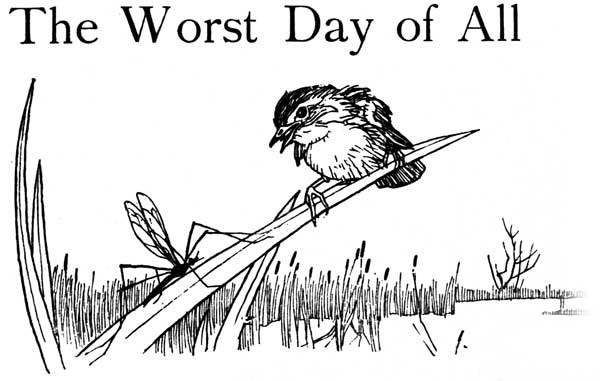
The summer was drawing to an end.
The beeches were quite yellow with the heat; and the pond was overgrown with plants almost right up to the middle. All the tadpoles had turned into frogs; all the young animals were growing and wanted more food. The water-lily and the spear-wort had stopped quarrelling, for they had nothing more to quarrel about. Both of them had lost their white blossoms and their heads were full of seeds.[Pg 110]
The reed-warblers' children were now so big that they had begun to leave the nest and flutter about in the weeds. But they were not quite sure of themselves and still dangled after their parents. They never went so far away but that they could easily return to the nest; and they lay in it every evening and fought for room and bit and kicked one another, while their half-starved parents sat beside them and hushed them.
"Oh, mummy ... do get me that fly!" said one.
"I can't catch these horrid midges," said the second.
"Boo-hoo!... Boo-hoo!... The dragon-fly flew away from me!" said the third.
"I daren't take hold of the daddy-long-legs," said the fourth.
But the fifth said nothing, for he was a poor little beggar, who always hung his beak.
"We'll never make a proper reed-warbler of him," said the father.
And, when they were being drilled in flying and hopping and scrambling in the reeds, or examined in singing, the fifth was always behind the rest.
"We shall never be able to drag him with us to Italy," said the reed-warbler.
And little Mrs. Reed-Warbler sighed.
In the water below, the duck splashed about with her grown-up ducklings.[Pg 111]
"The end is near," she said. "I am sure of it. I have a horrid presentiment all over my body."
"What harm can happen to you?" asked Mrs. Reed-Warbler. "You don't travel, so you're not exposed to as many dangers as the rest of us."
"One can never tell," said the duck. "I feel it in my back."
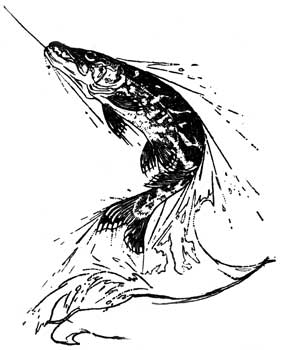
Then she paddled on and quacked to her children with her anxious old voice and wore a distressful look in her eyes.
One day something happened that set the whole pond in commotion.
The pike was suddenly hauled up out of the water.
The reed-warbler saw it himself. The pike hung and sprawled terribly at the end of a thin line, flew through the air in a great curve and fell down on the grass. At[Pg 112] the other end of the line was a rod, and at the other end of the rod a boy, who was crimson in the face with delight at the big fish he had caught.
"It serves him right, the highwayman!" said the perch.
"Thank goodness, he's gone!" croaked the frogs.
And all the little roach and carp danced round the water with delight.
"He had not many friends," said the reed-warbler.
"He had not one," said the perch. "He was the worst robber in the pond."
"He never did anything to me," said the water-lily. "He was a brave and distinguished gentleman, who hadn't his equal among the lot of you. It was always a real pleasure to me when he came sweeping past my stalks."
"Well, I have seen many go sweeping down his throat," said the eel. "And they did not think that so amusing. But he did just what I should have done in his place! Now that he's gone, I suppose I'm the biggest in the pond."
He stretched himself to his full length.
"You have grown big and stout," said the reed-warbler.
"I have had a good year," said the eel. "But I shall soon be going to sea now and working off my fat."[Pg 113]
On the evening of the same day a man stood at the edge of the pond, just where the reed-warblers lived. He wore high boots with wooden soles and whetted a scythe till the sound of it whizzed through the air.
"What's going to happen now?" said Mrs. Reed-Warbler.
"Quack! Quack!" cried the duck in terror.
But the man spat on his hands and took hold of the scythe. Then he walked out into the water and began to cut down the reeds, close in, at the edge, and right out, as far as they grew. They fell into the water, with a soft sigh; and then, when he had finished, he stood on the bank and contemplated his work.
"That was a fine clearing," he said. "Duck-hunting begins to-morrow."
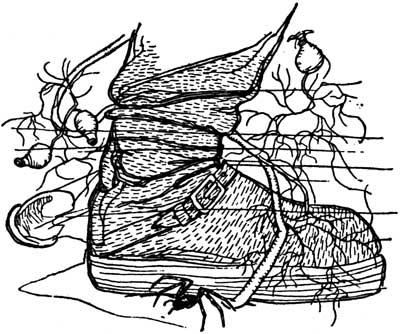
Then he went a bit farther with his scythe and made another clearing.
But he had caused terrible misfortunes. He had torn the water-spider's nest and crushed the spider herself. He had broken the bladder-wort at the root with his[Pg 114] heavy wooden boots. And the reed-warblers' nest lay overturned among the cut reeds.
The reed-warblers flew round the nest with loud screams:
"The children! The children!" they cried.
The children had saved themselves. Four had fluttered on land and sat there and looked thoroughly bewildered. The fifth was half-buried under the reeds and could not get out.
The two old ones with difficulty brought it in to the others:
"Oh dear! oh dear!" said little Mrs. Reed-Warbler, in despair. "What are we to do now?"
"It might have been worse," replied her husband. "Suppose it had happened a month ago! Now the youngsters are able to look after themselves, all except that one there."
"Oh, it was a terrible place to come to!" said she. "It was a great shame of you to drag me here. I would much rather have remained in Italy, even if I had never got married."
"Don't talk nonsense, wife," said he. "You wanted to come here just as much as I did. This is where we were born and where our home is and where we had to build our nest. We can't help it; it's in our blood. Besides, we have had a very good time, and have shared[Pg 115] each other's joys and sorrows. Don't let us squabble now in our old age, but rather see that we get the children's travelling-suits ready and then be off."
Then she became sensible and they sat late into the night and talked about it. The youngsters ran round in the grass and ate ants and thought the whole thing great fun, for children know no better. Only the fifth one hung about disconsolately.
"What are we to do with the poor little wretch?" said Mrs. Reed-Warbler, pushing a mouthful to him.
"We shall never get him to Italy alive," said her husband.
Quite early next morning there was a tremendous uproar round the pond.
Men shouted and dogs barked. They put out the boat and rowed her with difficulty through the thick weeds. The woman of the pond stood outside her cottage, curtseying and pouring out tea.
"Whatever is this?" asked the reed-warbler.
"It's the world coming to an end," said the duck. "Quack! Quack! Quack!"
"To the bottom! To the bottom!" said the eel. "Wriggle and twist!"
The terrified reed-warbler family pressed close together in the grass. But then the two old ones grew inquisitive and could not keep still. They warned the[Pg 116] youngsters to stay quiet, whatever happened, and sat down, a little way from each other, on the tops of the reeds beside the clearing.
"Bang! Bang!" went the guns over the pond. "Bang! Bang! Bang!"
And there were lots of ducks quacking and lots of small birds who flew out of their hiding-places in terror. Great ugly dogs, with their tongues hanging out of their mouths, swam round and barked. The leaves of the water-lily dived right under the water and the spear-wort disappeared entirely and never came back again.
"Bang! Bang! Bang!"
"There lies our duck," said the reed-warbler.
And there she lay on her back, dead, only waiting for the dogs to come and fetch her.
"Bang! Bang!"
"I must get away, I can stand it no longer," said Mrs. Reed-Warbler. "Let us fly back to the children."
She received no answer and, when she looked round, her husband was gone.
She stared at the reed on which he had been sitting and up in the air and down at the water. Then she gave a frightful scream:
"Oh, poor forlorn widow that I am! What shall I do? What shall I do?"
He lay in the water, hit by a stray shot, dead, stiff.[Pg 117]
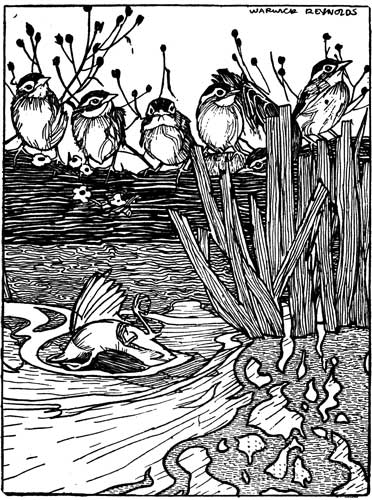 'HE LAY IN THE WATER, HIT BY A STRAY SHOT'
'HE LAY IN THE WATER, HIT BY A STRAY SHOT'
"Children! Children! Your father is dead!"
The four looked at her in dismay, when she brought the news; the fifth stared vacantly and stupidly, as usual. The uproar continued, out in the pond. The six reed-warblers sat in a row on the edge and were at their wits' end what to do.
Then, gradually, it became quiet again.
The smoke of the powder lifted and the water calmed down. The men with the guns sat up above in the wood and ate their lunch; and the woman of the pond counted the money she had made.
"That was a terrible business," said the water-lily.
"My husband is dead," said Mrs. Reed-Warbler and sang a dirge that would have moved a stone.
"My respectful condolences, madam," said the eel and came up out of the mud. "But will you admit that I was right? Think how much care and sorrow one escapes by keeping out of all this domesticity. I don't know my wife, as I once had the honour of telling you; I have never seen her. It wouldn't occur to me to shed a tear if anyone told me that she was dead."
"You horrid, heartless person!" said Mrs. Reed-Warbler. "To talk like that to a widow with five children, all unprovided for, and one of them a cripple too!"
"Oh, those women!" said the eel and disappeared.[Pg 120]
That evening, little Mrs. Reed-Warbler sat and thought things over.
"We must go," she said, "this very night. There's nothing else for us to do. If we fly and hop as well as we can and work hard and behave sensibly, we shall be all right."
"I can't keep up with you," said the crippled child.
"I was forgetting you," said Mrs. Reed-Warbler.
She looked at the poor child for a while. Then she shook her wings and took a quick resolve:
"No, you can't keep up with us," she said. "And we can't stay here and be ruined for your sake. If I leave you behind, you'll be eaten by a fox or a cat or those greedy ants. It would be a pity for you to be tortured, you poor little fellow. It's better that I should kill you myself and have done with it."
Then and there, she rushed at the youngster and pecked away at his head until he was dead:
"Now let's be off!" she said.
"Madam," said the eel, "you must not go without allowing me to say good-bye to you. You are a charming woman and you know how to adapt yourself to circumstances. You were incensed at the horrid robbers in the pond; and you yourself ate innocent flies from morning till night. You loved poetry; but you ate the poor May-fly, though you promised her that she should[Pg 121] be allowed to live her poetic life for an hour. You were furious with the spider who ate her mother, and with the cray-fish, who ate her children; and now, of your own accord you have pecked your sick child to death, so that you may go to Italy."
"Thank goodness, I sha'n't see you any more, you detestable, spiteful fellow!" said Mrs. Reed-Warbler. "But I may as well tell you that I killed my child for pity."
"And the spider ate her mother from hunger and the cray-fish her children from love," said the eel. "And I let mine shift for themselves from common sense!"
"My dears," said Mrs. Reed-Warbler, "that eel was positively created to live in this horrible pond!"
Then they flew away.
"I don't think I shall stay here, for all that," said the eel. "I am longing for the sea."
He looked round warily, then crept up into the grass and wriggled and
twisted quickly to the nearest ditch.[Pg 122]
[Pg 123]
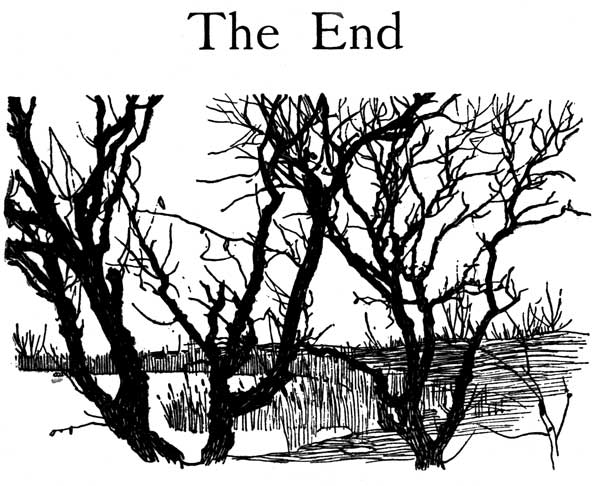
November came and was no different from what it usually is.
The trees stood with bare branches. The leaves rustled over the earth or floated on the pond. The reeds were all cut down; the water-lily's leaves withered away, with stalks and all, while she, deep down at the bottom,[Pg 124] slept her winter sleep and dreamt of her next white spring costume.
And down at the bottom lay all the frogs, buried deep in the mud, so that only their noses stuck out. It looked as though the pond were paved with frogs' noses. The plants in the water were as leafless as the plants on land. Hidden among the stalks and withered leaves, under the stones and in the mud lay animals sleeping, or eggs waiting for the spring to come and hatch them.
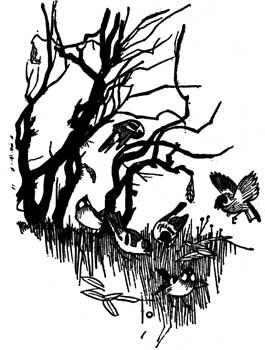
All the birds had flown, except the chaffinch and a few others, who hopped about and managed as best they could. The flies were all gone and the dragon-flies and spiders and midges and butterflies and all the rest. There were only a few grumpy fish left in the pond.
And the storm raged[Pg 125] among the trees, till they cracked and creaked, and whipped the pond up into tall waves with foam on their crests.
"It is really horrid here in winter," said the woman of the pond, as she stuffed her windows with moss. "Such a howling in the chimney and a creaking and cracking in the wood and a roaring and rushing in the pond! I wish we had the glorious summer again. That is a[Pg 126] happy time and peaceful time. Then it's pleasant living by the pond."
A poet, accompanied by seven ladies, walked on the path around the pond.
He wore a fur-lined coat and turned the collar over his ears; and the ladies were wrapped up so that nothing showed but the tips of their noses. For it was very cold.
"Ladies," said the poet, "when you look at that wild unsightly pond now, you have simply no idea how charming it can be in summer. Now, all these elements have been let loose. Waves rage against waves, the storm rushes round and the trees stand naked and disconsolate. It is a real picture of strife and sorrow and cruelty. But, ladies, come out here on a summer's day and you shall see a different sight. Then the reeds grow along the banks in all their elegance; water-lily and spear-wort float side by side upon the surface of the water and nod smilingly to each other with their white flowers. The midges hover in the air and the frogs croak and glad birds sing. Deep in the water swim beautiful fish disporting themselves gaily. The mussels in the mud dream of beautiful pearls, the cray-fish crawl slowly round and round and enjoy life and happiness. Ladies, you simply cannot imagine what a picture of peace and happiness the pond offers. It is, as it were,[Pg 127] an abstract of all the wonderful harmonies of Nature, the sight of which consoles us poor mortals, who strive and wrangle from morn till dewy eve and envy and slander and persecute one another. Remember, ladies, to come out to the pond when summer is here. It braces a mortal for his bitter fight to see the peace and gladness in which God's lower creatures live ... those of His creatures which have not received our great intellectual gifts, but a purer and deeper happiness instead."
Thus spake the poet. And seven ladies listened respectfully to his words ... and nobody laid violent hands upon him.
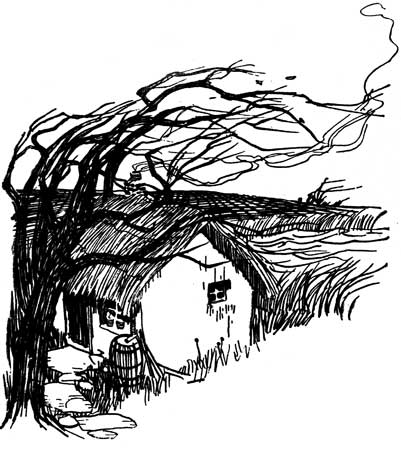
THE END
BRISTOL: BURLEIGH LTD., AT THE BURLEIGH PRESS
Transcriber's note:
The majority of the images in this book are untitled, and are 'in context' with where they are placed. No 'title' or 'alt' has been used when placing them.
End of the Project Gutenberg EBook of The Pond, by Carl Ewald
*** END OF THIS PROJECT GUTENBERG EBOOK THE POND ***
***** This file should be named 31708-h.htm or 31708-h.zip *****
This and all associated files of various formats will be found in:
http://www.gutenberg.org/3/1/7/0/31708/
Produced by D Alexander and the Online Distributed
Proofreading Team at http://www.pgdp.net (This file was
produced from images generously made available by The
Internet Archive)
Updated editions will replace the previous one--the old editions
will be renamed.
Creating the works from public domain print editions means that no
one owns a United States copyright in these works, so the Foundation
(and you!) can copy and distribute it in the United States without
permission and without paying copyright royalties. Special rules,
set forth in the General Terms of Use part of this license, apply to
copying and distributing Project Gutenberg-tm electronic works to
protect the PROJECT GUTENBERG-tm concept and trademark. Project
Gutenberg is a registered trademark, and may not be used if you
charge for the eBooks, unless you receive specific permission. If you
do not charge anything for copies of this eBook, complying with the
rules is very easy. You may use this eBook for nearly any purpose
such as creation of derivative works, reports, performances and
research. They may be modified and printed and given away--you may do
practically ANYTHING with public domain eBooks. Redistribution is
subject to the trademark license, especially commercial
redistribution.
*** START: FULL LICENSE ***
THE FULL PROJECT GUTENBERG LICENSE
PLEASE READ THIS BEFORE YOU DISTRIBUTE OR USE THIS WORK
To protect the Project Gutenberg-tm mission of promoting the free
distribution of electronic works, by using or distributing this work
(or any other work associated in any way with the phrase "Project
Gutenberg"), you agree to comply with all the terms of the Full Project
Gutenberg-tm License (available with this file or online at
http://gutenberg.org/license).
Section 1. General Terms of Use and Redistributing Project Gutenberg-tm
electronic works
1.A. By reading or using any part of this Project Gutenberg-tm
electronic work, you indicate that you have read, understand, agree to
and accept all the terms of this license and intellectual property
(trademark/copyright) agreement. If you do not agree to abide by all
the terms of this agreement, you must cease using and return or destroy
all copies of Project Gutenberg-tm electronic works in your possession.
If you paid a fee for obtaining a copy of or access to a Project
Gutenberg-tm electronic work and you do not agree to be bound by the
terms of this agreement, you may obtain a refund from the person or
entity to whom you paid the fee as set forth in paragraph 1.E.8.
1.B. "Project Gutenberg" is a registered trademark. It may only be
used on or associated in any way with an electronic work by people who
agree to be bound by the terms of this agreement. There are a few
things that you can do with most Project Gutenberg-tm electronic works
even without complying with the full terms of this agreement. See
paragraph 1.C below. There are a lot of things you can do with Project
Gutenberg-tm electronic works if you follow the terms of this agreement
and help preserve free future access to Project Gutenberg-tm electronic
works. See paragraph 1.E below.
1.C. The Project Gutenberg Literary Archive Foundation ("the Foundation"
or PGLAF), owns a compilation copyright in the collection of Project
Gutenberg-tm electronic works. Nearly all the individual works in the
collection are in the public domain in the United States. If an
individual work is in the public domain in the United States and you are
located in the United States, we do not claim a right to prevent you from
copying, distributing, performing, displaying or creating derivative
works based on the work as long as all references to Project Gutenberg
are removed. Of course, we hope that you will support the Project
Gutenberg-tm mission of promoting free access to electronic works by
freely sharing Project Gutenberg-tm works in compliance with the terms of
this agreement for keeping the Project Gutenberg-tm name associated with
the work. You can easily comply with the terms of this agreement by
keeping this work in the same format with its attached full Project
Gutenberg-tm License when you share it without charge with others.
1.D. The copyright laws of the place where you are located also govern
what you can do with this work. Copyright laws in most countries are in
a constant state of change. If you are outside the United States, check
the laws of your country in addition to the terms of this agreement
before downloading, copying, displaying, performing, distributing or
creating derivative works based on this work or any other Project
Gutenberg-tm work. The Foundation makes no representations concerning
the copyright status of any work in any country outside the United
States.
1.E. Unless you have removed all references to Project Gutenberg:
1.E.1. The following sentence, with active links to, or other immediate
access to, the full Project Gutenberg-tm License must appear prominently
whenever any copy of a Project Gutenberg-tm work (any work on which the
phrase "Project Gutenberg" appears, or with which the phrase "Project
Gutenberg" is associated) is accessed, displayed, performed, viewed,
copied or distributed:
This eBook is for the use of anyone anywhere at no cost and with
almost no restrictions whatsoever. You may copy it, give it away or
re-use it under the terms of the Project Gutenberg License included
with this eBook or online at www.gutenberg.org
1.E.2. If an individual Project Gutenberg-tm electronic work is derived
from the public domain (does not contain a notice indicating that it is
posted with permission of the copyright holder), the work can be copied
and distributed to anyone in the United States without paying any fees
or charges. If you are redistributing or providing access to a work
with the phrase "Project Gutenberg" associated with or appearing on the
work, you must comply either with the requirements of paragraphs 1.E.1
through 1.E.7 or obtain permission for the use of the work and the
Project Gutenberg-tm trademark as set forth in paragraphs 1.E.8 or
1.E.9.
1.E.3. If an individual Project Gutenberg-tm electronic work is posted
with the permission of the copyright holder, your use and distribution
must comply with both paragraphs 1.E.1 through 1.E.7 and any additional
terms imposed by the copyright holder. Additional terms will be linked
to the Project Gutenberg-tm License for all works posted with the
permission of the copyright holder found at the beginning of this work.
1.E.4. Do not unlink or detach or remove the full Project Gutenberg-tm
License terms from this work, or any files containing a part of this
work or any other work associated with Project Gutenberg-tm.
1.E.5. Do not copy, display, perform, distribute or redistribute this
electronic work, or any part of this electronic work, without
prominently displaying the sentence set forth in paragraph 1.E.1 with
active links or immediate access to the full terms of the Project
Gutenberg-tm License.
1.E.6. You may convert to and distribute this work in any binary,
compressed, marked up, nonproprietary or proprietary form, including any
word processing or hypertext form. However, if you provide access to or
distribute copies of a Project Gutenberg-tm work in a format other than
"Plain Vanilla ASCII" or other format used in the official version
posted on the official Project Gutenberg-tm web site (www.gutenberg.org),
you must, at no additional cost, fee or expense to the user, provide a
copy, a means of exporting a copy, or a means of obtaining a copy upon
request, of the work in its original "Plain Vanilla ASCII" or other
form. Any alternate format must include the full Project Gutenberg-tm
License as specified in paragraph 1.E.1.
1.E.7. Do not charge a fee for access to, viewing, displaying,
performing, copying or distributing any Project Gutenberg-tm works
unless you comply with paragraph 1.E.8 or 1.E.9.
1.E.8. You may charge a reasonable fee for copies of or providing
access to or distributing Project Gutenberg-tm electronic works provided
that
- You pay a royalty fee of 20% of the gross profits you derive from
the use of Project Gutenberg-tm works calculated using the method
you already use to calculate your applicable taxes. The fee is
owed to the owner of the Project Gutenberg-tm trademark, but he
has agreed to donate royalties under this paragraph to the
Project Gutenberg Literary Archive Foundation. Royalty payments
must be paid within 60 days following each date on which you
prepare (or are legally required to prepare) your periodic tax
returns. Royalty payments should be clearly marked as such and
sent to the Project Gutenberg Literary Archive Foundation at the
address specified in Section 4, "Information about donations to
the Project Gutenberg Literary Archive Foundation."
- You provide a full refund of any money paid by a user who notifies
you in writing (or by e-mail) within 30 days of receipt that s/he
does not agree to the terms of the full Project Gutenberg-tm
License. You must require such a user to return or
destroy all copies of the works possessed in a physical medium
and discontinue all use of and all access to other copies of
Project Gutenberg-tm works.
- You provide, in accordance with paragraph 1.F.3, a full refund of any
money paid for a work or a replacement copy, if a defect in the
electronic work is discovered and reported to you within 90 days
of receipt of the work.
- You comply with all other terms of this agreement for free
distribution of Project Gutenberg-tm works.
1.E.9. If you wish to charge a fee or distribute a Project Gutenberg-tm
electronic work or group of works on different terms than are set
forth in this agreement, you must obtain permission in writing from
both the Project Gutenberg Literary Archive Foundation and Michael
Hart, the owner of the Project Gutenberg-tm trademark. Contact the
Foundation as set forth in Section 3 below.
1.F.
1.F.1. Project Gutenberg volunteers and employees expend considerable
effort to identify, do copyright research on, transcribe and proofread
public domain works in creating the Project Gutenberg-tm
collection. Despite these efforts, Project Gutenberg-tm electronic
works, and the medium on which they may be stored, may contain
"Defects," such as, but not limited to, incomplete, inaccurate or
corrupt data, transcription errors, a copyright or other intellectual
property infringement, a defective or damaged disk or other medium, a
computer virus, or computer codes that damage or cannot be read by
your equipment.
1.F.2. LIMITED WARRANTY, DISCLAIMER OF DAMAGES - Except for the "Right
of Replacement or Refund" described in paragraph 1.F.3, the Project
Gutenberg Literary Archive Foundation, the owner of the Project
Gutenberg-tm trademark, and any other party distributing a Project
Gutenberg-tm electronic work under this agreement, disclaim all
liability to you for damages, costs and expenses, including legal
fees. YOU AGREE THAT YOU HAVE NO REMEDIES FOR NEGLIGENCE, STRICT
LIABILITY, BREACH OF WARRANTY OR BREACH OF CONTRACT EXCEPT THOSE
PROVIDED IN PARAGRAPH F3. YOU AGREE THAT THE FOUNDATION, THE
TRADEMARK OWNER, AND ANY DISTRIBUTOR UNDER THIS AGREEMENT WILL NOT BE
LIABLE TO YOU FOR ACTUAL, DIRECT, INDIRECT, CONSEQUENTIAL, PUNITIVE OR
INCIDENTAL DAMAGES EVEN IF YOU GIVE NOTICE OF THE POSSIBILITY OF SUCH
DAMAGE.
1.F.3. LIMITED RIGHT OF REPLACEMENT OR REFUND - If you discover a
defect in this electronic work within 90 days of receiving it, you can
receive a refund of the money (if any) you paid for it by sending a
written explanation to the person you received the work from. If you
received the work on a physical medium, you must return the medium with
your written explanation. The person or entity that provided you with
the defective work may elect to provide a replacement copy in lieu of a
refund. If you received the work electronically, the person or entity
providing it to you may choose to give you a second opportunity to
receive the work electronically in lieu of a refund. If the second copy
is also defective, you may demand a refund in writing without further
opportunities to fix the problem.
1.F.4. Except for the limited right of replacement or refund set forth
in paragraph 1.F.3, this work is provided to you 'AS-IS' WITH NO OTHER
WARRANTIES OF ANY KIND, EXPRESS OR IMPLIED, INCLUDING BUT NOT LIMITED TO
WARRANTIES OF MERCHANTIBILITY OR FITNESS FOR ANY PURPOSE.
1.F.5. Some states do not allow disclaimers of certain implied
warranties or the exclusion or limitation of certain types of damages.
If any disclaimer or limitation set forth in this agreement violates the
law of the state applicable to this agreement, the agreement shall be
interpreted to make the maximum disclaimer or limitation permitted by
the applicable state law. The invalidity or unenforceability of any
provision of this agreement shall not void the remaining provisions.
1.F.6. INDEMNITY - You agree to indemnify and hold the Foundation, the
trademark owner, any agent or employee of the Foundation, anyone
providing copies of Project Gutenberg-tm electronic works in accordance
with this agreement, and any volunteers associated with the production,
promotion and distribution of Project Gutenberg-tm electronic works,
harmless from all liability, costs and expenses, including legal fees,
that arise directly or indirectly from any of the following which you do
or cause to occur: (a) distribution of this or any Project Gutenberg-tm
work, (b) alteration, modification, or additions or deletions to any
Project Gutenberg-tm work, and (c) any Defect you cause.
Section 2. Information about the Mission of Project Gutenberg-tm
Project Gutenberg-tm is synonymous with the free distribution of
electronic works in formats readable by the widest variety of computers
including obsolete, old, middle-aged and new computers. It exists
because of the efforts of hundreds of volunteers and donations from
people in all walks of life.
Volunteers and financial support to provide volunteers with the
assistance they need, are critical to reaching Project Gutenberg-tm's
goals and ensuring that the Project Gutenberg-tm collection will
remain freely available for generations to come. In 2001, the Project
Gutenberg Literary Archive Foundation was created to provide a secure
and permanent future for Project Gutenberg-tm and future generations.
To learn more about the Project Gutenberg Literary Archive Foundation
and how your efforts and donations can help, see Sections 3 and 4
and the Foundation web page at http://www.pglaf.org.
Section 3. Information about the Project Gutenberg Literary Archive
Foundation
The Project Gutenberg Literary Archive Foundation is a non profit
501(c)(3) educational corporation organized under the laws of the
state of Mississippi and granted tax exempt status by the Internal
Revenue Service. The Foundation's EIN or federal tax identification
number is 64-6221541. Its 501(c)(3) letter is posted at
http://pglaf.org/fundraising. Contributions to the Project Gutenberg
Literary Archive Foundation are tax deductible to the full extent
permitted by U.S. federal laws and your state's laws.
The Foundation's principal office is located at 4557 Melan Dr. S.
Fairbanks, AK, 99712., but its volunteers and employees are scattered
throughout numerous locations. Its business office is located at
809 North 1500 West, Salt Lake City, UT 84116, (801) 596-1887, email
[email protected]. Email contact links and up to date contact
information can be found at the Foundation's web site and official
page at http://pglaf.org
For additional contact information:
Dr. Gregory B. Newby
Chief Executive and Director
[email protected]
Section 4. Information about Donations to the Project Gutenberg
Literary Archive Foundation
Project Gutenberg-tm depends upon and cannot survive without wide
spread public support and donations to carry out its mission of
increasing the number of public domain and licensed works that can be
freely distributed in machine readable form accessible by the widest
array of equipment including outdated equipment. Many small donations
($1 to $5,000) are particularly important to maintaining tax exempt
status with the IRS.
The Foundation is committed to complying with the laws regulating
charities and charitable donations in all 50 states of the United
States. Compliance requirements are not uniform and it takes a
considerable effort, much paperwork and many fees to meet and keep up
with these requirements. We do not solicit donations in locations
where we have not received written confirmation of compliance. To
SEND DONATIONS or determine the status of compliance for any
particular state visit http://pglaf.org
While we cannot and do not solicit contributions from states where we
have not met the solicitation requirements, we know of no prohibition
against accepting unsolicited donations from donors in such states who
approach us with offers to donate.
International donations are gratefully accepted, but we cannot make
any statements concerning tax treatment of donations received from
outside the United States. U.S. laws alone swamp our small staff.
Please check the Project Gutenberg Web pages for current donation
methods and addresses. Donations are accepted in a number of other
ways including checks, online payments and credit card donations.
To donate, please visit: http://pglaf.org/donate
Section 5. General Information About Project Gutenberg-tm electronic
works.
Professor Michael S. Hart is the originator of the Project Gutenberg-tm
concept of a library of electronic works that could be freely shared
with anyone. For thirty years, he produced and distributed Project
Gutenberg-tm eBooks with only a loose network of volunteer support.
Project Gutenberg-tm eBooks are often created from several printed
editions, all of which are confirmed as Public Domain in the U.S.
unless a copyright notice is included. Thus, we do not necessarily
keep eBooks in compliance with any particular paper edition.
Most people start at our Web site which has the main PG search facility:
http://www.gutenberg.org
This Web site includes information about Project Gutenberg-tm,
including how to make donations to the Project Gutenberg Literary
Archive Foundation, how to help produce our new eBooks, and how to
subscribe to our email newsletter to hear about new eBooks.